Clergy members and supporters, totaling more than 200 people, marched to Civic Center on March 26, 2009, following a negative decision on Proposition 8 by the California Supreme Court.
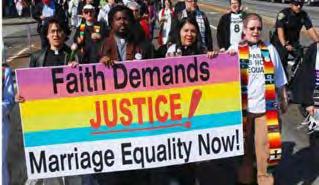
Prop 8 repeal heads to CA ballot in 2024
by Matthew S. Bajko
In 2024, 16 years after a slim majority of Golden State residents adopted a ballot measure banning same-sex marriage, California voters will have a chance to rescind that homophobic decision next November. The campaign to once-and-for-all undue what was known as Proposition 8 could also help dozens of LGBTQ and progressive candidates running throughout the state next fall.
After the state Assembly voted during Pride Month to place the Prop 8 repeal measure Assembly Constitutional Amendment 5 before voters, state senators followed suit July 13. Legislators in the chamber voted 31-0 with bipartisan support in favor of ACA 5.

“Today, with bipartisan support, we are one step closer to ensuring marriage equality as a fundamental right in California. ACA 5 will give voters the opportunity to remove a black stain from the California Constitution,” stated gay Assemblymember Evan Low (D-Sunnyvale), who was the lead author of the measure. “California is ready for love, and these protections will protect against any future attempts to restrict marriage rights for same-sex and interracial couples.”
Co-author gay state Senator Scott Wiener (D-San Francisco) expressed optimism in seeing voters adopt ACA 5.
“Next fall, Californians will reject the assault on LGBTQ rights that bigoted, ideological Justices have launched from the Supreme Court,” predicted Wiener. “The bipartisan support for this amendment shows once again that inclusion remains a core value across ideological lines in our state. I look forward to working with this incredible coalition to advance this critical protection.”
Two Democrats who had signed on as co-authors of ACA 5 didn’t cast votes last week, Senators Bill Dodd of Napa and Anthony J. Portantino of Burbank, while the lone Republican senator to vote for it was Scott Wilk of Santa Clarita. The seven other members of the Senate’s GOP caucus didn’t cast votes on ACA 5.
The decision to skip the vote by Senator Rosilicie Ochoa Bogh (R-Yucaipa), who currently holds the 23rd Senate District seat, led to an admonishment from transgender Palm
Bay Area lawyers use drag to benefit out-of-state LGBTQ groups
by Matthew S. Bajko
Texas families and health care providers this month filed suit against Lone Star State officials in a bid to block a law banning medical procedures for transgender youth from going into effect on September 1. HIV prevention agencies are closely following a federal lawsuit over Texans’ access to the medication PrEP that prevents transmission of the disease.
Watching the legal battles from afar are Bay Area lawyers outraged by the attacks on LGBTQ rights and preventative sexual health services. They have also been dismayed by the passage of laws specifically targeting drag performers, such as a Texas bill adopted this year that bans “sexually oriented performances” in the presence of minors.
Rather than merely kvetch, they are harnessing their connections in the local legal field and using their talents as drag performers to raise awareness and financially benefit LGBTQ agencies on the ground in Texas and other states where conservative lawmakers have been passing anti-LGBTQ laws.
“I was really sad for most of this year and, frankly, waking up every day really upset. Being able to focus on something active and positive has really helped me feel like there is something to keep working toward,” said nonbinary Oakland resident Ari Jones,
by Cynthia Laird
Gay former state senator and city supervisor Mark Leno perhaps came closest when he was in first place for several hours in San Francisco’s June 2018 special mayoral election. But after ranked choice votes were tabulated, he saw his Election Night lead disappear as former interim mayor and then-supervisor London Breed won the race to serve out the term of deceased mayor Ed Lee. And while there have been other lesbian and gay candidates for San Francisco mayor over the years, none has been successful in winning election to occupy Room 200 at City Hall.

In 1995, Roberta Achtenberg, a lesbian and former San Francisco supervisor who went on to a top post as an assistant secretary for the Department of Housing and Urban Development in the Clinton administration, left the federal government to run for mayor against incumbent Frank Jordan and Willie Brown, the powerful former state Assembly speaker. Believed to be the first serious out candidate, Achtenberg lost in the general election, and Brown defeated Jordan in the runoff.
“The idea was to come in at least second to be in the runoff,” Achtenberg said in a recent phone interview.
In 1999, gay then-supervisor Tom Ammiano, a progressive champion, shocked the political estab-
who performs in drag as Pop Rox. “I am very grateful this community exists, but I look forward to the day when trans people can exist in serenity.”
Jones, 31, is a director at Berkeley nonprofit Oasis Legal Services, where they represent LGBTQI+
asylees and other immigrant survivors of trauma. The native of Redwood City began performing in drag while at UC Berkeley School of Law.

Earlier this year Jones helped found a collective of drag artist legal professionals under the name Legalize Drag. The group hosted its first drag show benefit in the spring and raised $10,492 for organizations in Tennessee, where a law banning drag shows at public venues was deemed unconstitutional by a federal judge in June.
“I think that folks in the Bay Area really want to step up and express solidarity with those who are in less friendly embracing environments,” said Jones. “And, frankly, a lot of folks in the legal community have deeper pockets. So by focusing on performers that are also legal professionals, we are able to tap into some networks that have an ability to give right now.”

The collective is hoping to match or exceed what it raised for groups in the Volunteer State with its July 30 fundraiser for several Texas LGBTQ nonprofits. It is being held at a larger space, the queerowned nightlife venue El Rio in San Francisco’s Mission district.


“The group of performers we brought together for the Tennessee benefit had a lot of energy and wanted to keep putting on events. The group decided to name ourselves the House of Jurisprudence,”
See page 8 >>
lishment when he received enough votes as a writein candidate to challenge then-mayor Brown, who was seeking a second term. But big money from the mayor’s backers and a December runoff saw Ammiano lose that election. An inspired “Run, Tom, Run” movement had sprung up earlier that year, led by queer progressives, as he recounted in his 2020 book, “Kiss My Gay Ass: My Trip Down the Yellow Brick Road Through Activism, Stand-up, and Politics.”
Ammiano then lost in the 2003 election that fellow supervisor Gavin Newsom, now California’s governor, went on to win. There was another out candidate in that 2003 race, lesbian former supervisor Susan Leal, who by that time was serving as the city’s elected treasurer. Both Ammiano and Leal had won citywide races before, including for supervisor, yet the top political job was not within their grasp.

See page 10 >>

Serving the lesbian, gay, bisexual, transgender, and queer communities since 1971 www.ebar.com Vol. 53 • No. 29 • July 20-26, 2023 02 Uneven progress on AIDS SF Jewish Film Fest Amie Seiwert’s Imagery ARTS 13 13 The
See page 10 >>
ARTS 09
Rick Gerharter
Drag king Papi Churro is helping promote House of Jurisprudence’s July 30 drag show that will benefit LGBTQ organizations in their former home state of Texas.
JNC Snaps
San Francisco mayoral candidate Mark Leno, flanked by former supervisor and 2003 mayoral candidate Susan Leal, left, and former supervisor Sophie Maxwell, gathered with supporters at his campaign office on May 26, 2018.
Update on Castro bars
Rick Gerharter
With no LGBTQ SF mayoral candidate expected in 2024, past contenders recall steep hill they faced
Castro’s Q Bar reveals opening timeline
by John Ferrannini
ACastro neighborhood bar that’d been closed for years will be reopening in September after it passed its final inspection.
Meanwhile, a prominent vacant eatery in the city’s LGBTQ district that has also been closed for years will not reopen as projected this summer, according to the owner of the incoming business. And, representatives of a second planned Castro nightclub have stopped returning calls as another prominent shuttered restaurant space in the neighborhood has been put up for lease.
Q Bar, at 456 Castro Street, closed after a 2019 fire. It had been projected to reopen in the spring, the Bay Area Reporter reported in February.

Gay Q Bar co-owner Cip Cipriano had wanted to open the bar by Pride; however, at that point the bar hadn’t had its final inspection. Cipriano said, however, that as of July 12 the inspection had been passed.
“We are thrilled to announce that we just passed our latest round of inspections and are now in the home stretch,” Cipriano stated. “Keep your September calendars open. We are also pleased to welcome back many of our former bartenders that we’ve missed behind our bar just as much as you have.”
One of those is bar manager Christian Gabriel, a gay man who told the B.A.R. that though “there were many obstacles,” including the COVID pandemic, the bar team remained a family.
“It’s really exciting to imagine us all back together again,” Gabriel stated. “What Q Bar stood for was inclusivity for everyone, and also specifically creating a safe space for Black and Brown, Indigenous queer and trans people of color. These groups have always been underrepresented in the Castro and I’m glad to see that in our absence there is a lot more inclusivity in the neighborhood than there used to be. I’d like to
think that we played a role in promoting the idea that diversity and inclusivity can also be profitable.”
Indeed the B.A.R. reported July 10 that the new proprietors of the nowshuttered Harvey’s space – who announced this month their intent to turn it into a nightclub whose name will be announced in the coming weeks – intend to prioritize diversity.
“We ensure an inclusive and diverse space that is safe and welcoming for all members of the community regardless of race, gender, sexuality,” Joshua J. Cook, a co-owner of the new venture, said, adding that The Academy SF Head Mistress Mercedez Munro, who is Black, already expressed an interest in holding an event there. (The Academy is a membership-based event space and LGBTQ social club in the Castro.)
For decades, Black LGBTQ people have critiqued the Castro scene as being exclusive and unwelcoming toward them – a point driven home by controversies over the nearby 18th Street nightclub locations Badlands, which is now shuttered, and the Pendulum, which has since been renamed Toad Hall.
A 2004 report by the San Francisco
9 NEW BMR HOME OWNERSHIP OPPORTUNITIES
Pride, we wanted to take our time with it – make it beautiful.”
People interested in employment should contact chrisqbrsf@gmail.com.
Fisch and Flore
The B.A.R. previously reported that Fisch and Flore, a seafood restaurant, was looking for a June or July opening at 2298 Market Street, the space previously occupied by the iconic Cafe Flore. However, proprietor Serhat Zorlu, a straight ally, told the B.A.R. July 11 that necessary renovations to the space have only just started.
“At the moment we have another five months, approximately, to complete the construction,” Zorlu said, which puts the timetable to completion at the end of the year.
old electric and plumbing system has to be updated, and the building needs to be made compliant with the Americans with Disabilities Act.
Badlands
The fate of another closed Castro gay bar and dance club that was expected to reopen is less clear. The San Francisco LGBTQ nightclub Badlands, at 4121 18th Street, closed permanently in 2020 during the COVID pandemic and Natali teased that it would reopen that fall under new ownership. Natali did not return a request for comment for this report.
Human Rights Commission found that Badlands was discriminating against African Americans, but the findings were never official because Virginia Harmon, the HRC executive director at the time, did not sign off on the staff report. Badlands owner Les Natali, a gay man, and the complainants eventually reached a confidential settlement. Natali has always denied the accusations.
Natali later opened Toad Hall on the site of what had been the Pendulum, a bar that catered to Black LGBTQs.
Q Bar’s Gabriel continued that now is “the perfect time for us to come back and be part of really revitalizing Castro Street.”
“There are too many shuttered businesses and we want to show people that the Castro is a fun, safe, inclusive and very unique place to come and party and have a great time,” Gabriel stated.
Cipriano said that the spring opening date had been aspirational – it was not, he said, “like Moses coming down from the mountain.”
“It has to be perfect when we open,” Cipriano said. “Once we realized it wasn’t going to be open in time for
Lennar at The SF Shipyard is excited to offer new Below Market Rate program homes through the Mayor’s Office of Housing and Community Development BMR Limited Equity Program.*
Residences offer a contemporary design with elegant finishes including Kember ® hardwood flooring, modern cabinetry, quartz countertops and GE® stainless steel appliances.
Program qualifications include, but are not limited to: first-time homebuyers, complete a homebuyer workshop from an approved housing counseling agency, obtain a loan pre-approval from an approved BMR lender and cannot exceed the following income:
This isn’t the first projected delay, either. Hoodline had reported the space at the intersection of Market and Noe streets would open at the end of 2022.
In the B.A.R.’s report in March, Zorlu had teased the summer opening date as being “if everything goes well.”
When recently asked the reason for the delay, Zorlu said the construction “started approximately two weeks ago.” A mural of the late drag queen Heklina, who passed away unexpectedly in April while on tour in London, graces the construction walls fronting Market Street that went up during Pride Month in June.
“I think it’s just a process with construction in the city,” Zorlu said. When asked what, specifically, had happened to delay the timeline, Zorlu repeated himself: “it’s the process of doing construction in this city.”
The B.A.R. reported in the previous story that the construction process would require a great deal of moving things around inside. The look and character of the triangular corner space, which features an outdoor garden patio and an indoor dining area and bar housed in a glass solarium, should remain the same. But a 75-year-
Natali had told the B.A.R. February 9 that Badlands could be open again in as little as eight weeks pending an agreement with TJ Bruce, a gay man who owns a number of nightclubs on the West Coast, such as Splash San Jose and Badlands Sacramento.
While Natali and Bruce had said a deal was imminent February 9, Bruce confirmed February 10 that an agreement had not been signed, and neither man returned follow-up calls the next week. Then, on February 21, Bruce stated he could not speak for Natali. Around the same time, Badlands had to surrender its liquor license due to inactivity.
Hamburger Mary’s
Natali also owns the space that used to house Hamburger Mary’s at 531 Castro Street. The drag-themed restaurant opened in 2018 and closed amid the pandemic in 2020. For lease signs recently went on the building bearing the name of Cheryl Maloney, an agent with Vanguard Properties.
Maloney had told the B.A.R. in a March report that she was interviewing prospective tenants for Hamburger Mary’s. However, she has not responded to a request for comment for this report. t
Feds punted to Bonta in Brown case, letter shows
by John Ferrannini
The federal government told the San Francisco Board of Supervisors last month it’s deferring to the judgment of the California Attorney General’s office regarding an inquiry into San Francisco District Attorney Brooke Jenkins’ decision not to prosecute the killer of Banko Brown.
Brown was a 24-year-old unarmed unhoused Black trans man shot by a security guard outside a Market Street Walgreens in April. Community activists and some city officials had called on the justice department to review Jenkins’ handling of the case.
Apply at housing.sfgov.org. Please contact our New Home Consultants for more information at 415-975-4181 or bayareaurban@lennar.com.
(3) Studios $169,331 without parking/up to $184,407 with parking.
(3) One-bedroom/1 bath $205,137 without parking/up to $223,063 with parking.
(3) Two-bedrooms/2 baths $234,099 without parking/up to $266,285 with parking.
Among them had been District 10 Supervisor Shamann Walton, the lone Black member of the board. But Walton disclosed July 17 that he had received a letter from the justice department’s criminal division, dated 28, that it was punting on the matter.
“We will keep working to seek justice for Banko Brown,” pledged Walton.
Jenkins said her office had dismissed a charge of homicide in the case because evidence showed that security guard Michael Earl-Wayne Anthony was acting in selfdefense. According to store video released by the DA’s office, Anthony confronted Brown, tackled him on the ground, then appeared to let him leave. As Brown is walking backward outside the store, Anthony shot him, the video shows.

Walgreens cut ties with security company Kingdom Group Protective Services –which had just moved to a “hands-on” policy regarding stolen merchandise the day of the killing – in late May. Anthony was attempting to stop Brown from allegedly leaving the store with unpaid items. San Francisco supervisors voted unanimously in May to ask the federal DOJ and California Attorney General Rob Bonta to investigate Jenkins’ decision. Bonta’s office announced it would be investigating, as the Bay Area Reporter reported May 24.
The following month the DOJ wrote Angela Calvillo, clerk of the Board of Supervisors, that “based on the information you provided, you may wish to forward your complaint to the State Attorney General for your state, who has jurisdiction to review the matters that you raise.”
“If you have evidence of a violation of federal criminal law, you should provide that information to the office of the Federal Bureau of Investigation (FBI) in your area,” the letter, attributed to correspondence management staff, stated. “In cases concerning alleged violations of federal law, the FBI will determine whether a federal investigation may be warranted.”
Separately, in an undated letter, DOJ intergovernmental liaison Megan A. Bennett wrote Walton that his own letter asking for a federal inquiry had been received.
2 • Bay area reporter • July 20-26, 2023 t *Income and sales price information listed is based on information provided by the City and County of San Francisco. For information about buyer requirements and program eligibility, visit https://housing.sfgov.org/ and https://sf.gov/reports/october-2022/below-market-rate-bmr-ownership-programs . Program valid towards select homes in the SF Shipyard community. See a New Home Consultant for additional details. There is no guarantee that participation in the interest list will result in priority over other buyers who do not comply with the foregoing requirements. Features, amenities, floor plans, elevations, and designs vary and are subject to changes or substitution without notice. Items shown are artist’s renderings and may contain options that are not standard on all models or not included in the purchase price. Availability may vary. Prices do not include closing costs and other fees to be paid by buyer (including a builder fee, if applicable, as described in the purchase agreement) and are subject to change without notice. All product and/or company names are trademarks TM or registered trademarks ® of their respective owners, and use of these marks does not imply any sponsorship, endorsement, support, or affiliation between the trademark owners and Lennar. This is not an offer in states where prior registration is required. Void where prohibited by law. Copyright © 2023 Lennar Corporation. Lennar and the Lennar logo are U.S. registered service marks or service marks of Lennar Corporation and/or its subsidiaries. Lennar Sales Corp., CA DRE Broker #01252753 (Responsible Broker: Joanna Duke). BMR Construction, Inc., CA CSLB #830955. Lennar Homes of California, Inc., CA CSLB #728102. Date 07/23
1 Person 2 Persons 3 Persons 4 Persons 5 Persons $80,700 $92,250 $103,750 $115,300 $124,500
SUNDAY, SEPTEMBER
DRAWING (Note: applicants that meet all requirements will be entered into a lottery drawing conducted by the City of San Francisco for the opportunity to purchase a Below Market Rate home. Drawing will occur on Tuesday, September 26, 2023 at 11am/PST)
APPLICATIONS MUST BE RECEIVED BY 5PM/PST ON
3, 2023 TO PARTICIPATE IN
MADISON CONDOMINIUMS FIND OUT MORE INFORMATION lennar.com/shipyardbmrhomes WELCOME HOME CENTER 11 Innes Ct., San Francisco, CA 94124 Homes available through the San Francisco Mayor’s Office of Housing and Community Development and are subject to monitoring and other restrictions. Visit www.sfmohcd.org for program information. 80% Maximum Annual Incomes
<< Community News
Q Bar on Castro Street is eyeing a September reopening. Scott Wazlowski
5 >>
Banko Brown was killed in April.
See page

Castro Street closure OK’d for lesbian tech confab
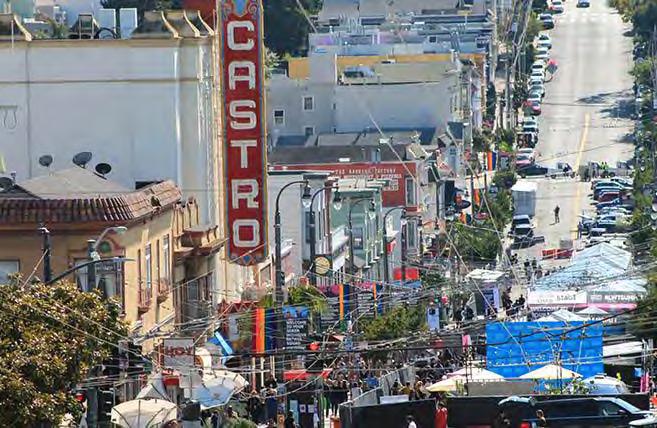 by John Ferrannini
by John Ferrannini
The city committee that oversees San Francisco street closures on July 13 approved most of Lesbians Who Tech’s proposed Castro neighborhood plans for its mid-October confab – with one major exception.
The Interdepartmental Staff Committee on Traffic and Transportation, or ISCOTT, declined to approve the closure of Jane Warner Plaza on the advice of Leslie Bienenfeld of the San Francisco Municipal Transportation Agency. Muni’s F-Line streetcar requires any closure of the plaza be brief, she said, considering staffing limitations imposed by other events in the city around the time of the queer tech event, such as the United States Navy Blue Angels airshow, scheduled for October 6-8.
“You’re proposing to take Jane Warner Plaza and the place that covers the train tracks for six days,” Bienenfeld said. “That’s a very staffing-intensive change for us. It’s our turnaround, it’s our layover point, and our staffing is such we cannot support losing it for six days. At most, we can lose it for one day.”
Acting SFMTA spokesperson Stephen Chun on July 14 wrote in an email that references to the popular Blue Angels show was a “miscommunication” and does not impact Lesbians Who Tech.
“The event’s duration brings staffing challenges; we cannot meet the demand of a six day event without careful planning,” Chun stated, referring to the tech confab. “Muni and Lesbians Who Tech worked closely together to support the two blocks of closure of Castro Street, which impacts the 24, 33, and 35, and is the core of the event footprint. The proposal to close Jane Warner [Plaza] is new for this year, and since it impacts an active railway in a historic neighborhood, this comes with many logistical challenges still to be worked out.”
Bryan Biello, the director of production for Lesbians Who Tech & Allies, was disappointed. The group – which is having its 10th annual gathering along Castro Street from October 16-20 – had been hoping to have check-ins at the plaza.
“We support changing the size of those tents to set that up differently so it doesn’t obstruct the tracks,” Biello said. “Is that a conversation I can have with you?”
Not really, according to Bienenfeld. There are safety issues to consider too, given the relatively small size of the plaza.
“People get distracted,” she said. “They run into their colleague from a few years ago and aren’t paying attention. In my opinion, the safest thing to do is to move this out of Jane Warner Plaza.”
SFMTA street use manager Bryant Woo moved to approve the street clo-
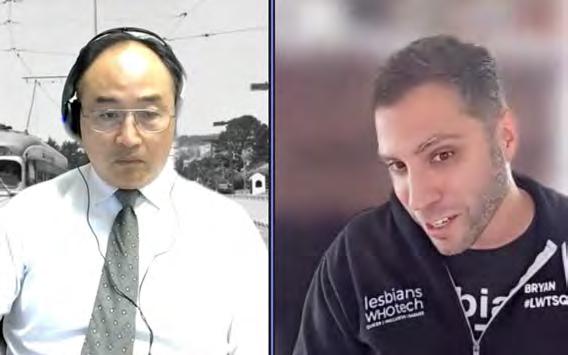
sures except the proposed closure on 17th Street between Castro and Hartford streets (Jane Warner Plaza) from October 16 at 12:01 a.m. to October 21 at 9:30 a.m. ISCOTT voted unanimously to approve those and table the Jane Warner Plaza closure until after Lesbians Who Tech and the SFMTA have had the opportunity to conduct an on-site visit.
Nonetheless, Woo said, Lesbians Who Tech shouldn’t expect that closure to be approved.
“I’m going to tell you right now our operating requirements, as required by the California Public Utilities Commission, require extremely stringent clearances and limited access with regard to rail facilities,” Woo said. “To have an event encouraging crowds adjacent to those rails is extremely sensitive, so I’m not going to say absolutely no, but it’ll be an extensive uphill challenge.”
Toni Muñoz, vice president of production and project management at Lesbians Who Tech, said the group might be willing to push.
“If we love a good uphill battle, great,” she said.
Tech group works with merchants
Muñoz said the purpose of the event is to provide a “safe space” for lesbians, nonbinary people, and people of color.
“We’re here to empower and connect LGBTQ+ women and nonbinary leaders, and women of color, in business,” she said.
“We try to give them access to tech companies in this amazing area in the Castro neighborhood, which is even more important with the enormous number of layoffs we’ve seen, unfortunately.”
Last year, however, many Castro merchants didn’t feel it was a safe space for them, and complaints about the street closures impacting deliveries and foot
traffic were legion, as the Bay Area Reporter reported at the time.
In particular many people, including queer youth, were upset about fencing that was installed along Castro Street for the conference.
Laura Lala-Chávez, a nonbinary person who is the executive director of the Lavender Youth Recreation and Information Center, or LYRIC, was at last November’s merchants meeting to introduce themself. Following a lengthy discussion on the Lesbians Who Tech conference, which had occurred the prior month, Lala-Chávez said that youth were dismayed by the fencing.
“It was hard for our young people to see the Lesbians Who Tech conference and see that barricade there,” LalaChávez said.
Since then, the fencing issue has led to increased cooperation by Lesbians Who Tech and the Castro Merchants Association, culminating in the business group backing this year’s confab at its March meeting but only if it replaced its fencing with barricades, as the B.A.R. reported.
Patrick Batt of Auto Erotica on 18th Street had compared last year’s scene to an “armed camp.”
Terry Asten Bennett, a straight ally who’s the president of the Castro Merchants Association, told the B.A.R. that she hopes the event is successful.
“I am happy to continue working with Lesbians Who Tech to try to make the event a success for all,” she stated. “I have connected them with Pete Betancourt of Castro Street Seen as a way to make the exterior of the barrier feel more interactive and inclusive.”
Castro Street Seen has put photos of various Castro historical events on shuttered businesses, such as Harvey’s at 500 Castro Street. Betancourt did not return an immediate request for comment on July 13.
Batt was not so sanguine about the confab; he wrote the SFMTA about his concerns July 11, urging the street closures not be approved.
“It must be noted there has been public radio silence from LWT since that [March] meeting on the issues raised,” he stated in his letter. “In fact, in April I reached out to the Austin, Texas LWT contact person asking to be notified when their ISCOTT hearing was scheduled. I was informed they would be happy to get that information to me.

I never received the consideration of that notification and only learned about the hearing when I saw notices recently posted on light poles. … This event has clearly, for some years, outgrown the Castro district and should NOT be approved for 2023.”
Indeed, during that merchants’ meeting, Lesbians Who Tech had teased an ISCOTT hearing March 15; however, no meeting was scheduled that day and the organization never responded to multiple B.A.R. requests for comment.
After the vote, Batt told the B.A.R., “I think it’s clear the merchants were misrepresented on exactly what was going to happen and why a vote was taken in the March meeting. I think the contingencies were most important to the group, and Lesbians Who Tech decided to ghost the organization when they got the vote they did get because nobody reached out to resolve this or that concern.”
SFMTA’s Nick Chapman responded to Batt the same day that the event will probably happen “barring significant pushback from the community or the loss of support from City Hall and the key stakeholder groups in the Castro.”
“We’re aware of the impacts of the event generally, and also of the negative responses to last year’s conference, which included frustration with the look and feel of the black clad fenc-

ing around the event site,” Chapman stated. “And it is certainly a significant impact given the location and the private/for-profit nature of the event. … I have discussed alternative venues with the organizers since the first time this event was held on 18th Street, but they continue to view the prestige/marquee value of being in the Castro as vital to their goals.”
Batt said, “I don’t think they care about the neighborhood, frankly.”
“They just want a pretty background for their event,” he said.
At last week’s meeting, Biello stressed the cooperation with area businesses in his presentation; the check-ins initially being planned for Jane Warner Plaza were part of this, he said, as it would give attendees “greater visibility” of businesses they could patronize.
“We communicated a lot with the business about their pain points from last year’s events,” he said. “Packages, food truck deliveries have been a hurdle for them, so we wanted to set up delivery zones for them, for UPS, Uber Eats. It’s also a great place to serve as a rideshare access point, or a taxi stand.”
Lesbians Who Tech will also be hiring people to direct pedestrians and ensure there’s not double parking along 18th Street, Biello said.
The street closures that were approved are Castro Street between Market and 18th streets from October 16 at 12:01 a.m. to October 21 at 9:30 a.m.; Castro Street between 18th and 19th streets between October 16 at 12:01 a.m. and October 21 at 7 a.m.; the parking lot behind the Castro Theatre from October 16 at 12:01 a.m. to October 21 at 2 p.m.; and the parking lot between the Castro Street Walgreens and Toad Hall on 18th Street from October 16 at 12:01 a.m. to October 21 at 10:30 a.m. t
4 • Bay area reporter • July 20-26, 2023 t 415-626-1110 130 Russ Street, SF okellsfireplace.com info@okellsfireplace.com OKELL’S FIREPLACE
Valor LX2 3-sided gas fireplace shown here with Murano glass, and reflective glass liner
<< Community News
Castro Street was fenced off during the October Lesbians Who Tech conference in the LGBTQ neighborhood.
Heather Cassell SFMTA’s street use manager Bryant Woo, left, and Lesbians Who Tech’s Bryan Biello discussed street closures planned for the October business conference in the Castro.
Screengrab via SFGovTV
Eyed for repeal, CA adds 3 more states to banned list
by Matthew S. Bajko
Even as the policy is being eyed for repeal this year, California’s ban on state-funded travel to states with antiLGBTQ laws is expanding. Missouri, Nebraska, and Wyoming are being added to it, meaning California will soon restrict its employees from traveling to more than half the country on taxpayers’ dime.
It comes as state lawmakers are moving to repeal the travel ban policy, first enacted in 2016, and replace it with a privately funded pro-LGBTQ marketing effort in the states it covers. Earlier this year lesbian Senate President pro Tempore Toni Atkins (D-San Diego) unveiled her Senate Bill 447 called the BRIDGE Act, which stands for Building and Reinforcing Inclusive, Diverse, Gender-Supportive Equality, to end the travel ban.
It has since passed out of the Senate and is now before the state Assembly. Gay Assemblymember Evan Low (DCupertino), who wrote the initial legislation establishing the travel ban, has given SB 447 his qualified support.
A broad coalition of LGBTQ groups and leaders have endorsed Atkins’ bill. San Francisco officials this spring rescinded the city’s travel ban policy, which also had covered states that restricted abortion and voting access, and prohibited city agencies from doing business with companies headquartered in the states covered by the ban.

The state last updated its travel ban
“The Department acknowledges receipt of your letter and will refer your request for a review to the proper investigative agency or component for assessment,” Bennett wrote to Walton, who on Monday also released the correspondence. “The Department takes requests of this nature seriously. The Department does not ordinarily confirm or deny the existence of an investi-
that have
list in September 2022 with the addition of Georgia after Peach State lawmakers enacted restrictions against transgender female student athletes. Earlier that summer Indiana, Utah, and Louisiana had also landed on the list due to passing anti-LGBTQ laws.
With the policy still in effect, California Attorney General Rob Bonta (D) announced July 14 that his office was adding the three new states to the so-called no fly list that his office is responsible for overseeing. They bring the number of states covered by the travel ban to 26.

“As mandated by AB 1887, we are, thus, compelled to impose restrictions on state-funded travel to Missouri, Nebraska, and Wyoming in response to
gation. You should not interpret this acknowledgement as confirmation of an investigation of the matters described in your letter. We hope this information is helpful. Please do not hesitate to contact this office if we may provide additional assistance regarding this or any other matter.”
John Burris, a longtime civil rights attorney suing Walgreens, the security guard, and the security company on behalf of Brown’s family for no less than $25 million, told the B.A.R. July 18 that
their discriminatory laws targeting the LGBTQ+ community,” stated Bonta, referring to Low’s Assembly Bill he had passed that established the list.
In response to the latest additions of states now covered by the travel ban, Atkins tweeted it is another reason why the policy needs to be replaced with a new strategy. The travel ban, wrote Atkins, “didn’t stop 23 other states from passing anti-LGBTQ+ laws, and didn’t stop these latest three either. It’s time for a different approach.”
The ban on travel to Wyoming, ironically nicknamed the “Equality State,” went into immediate effect on Friday due to the enactment of Senate File No. 133. The law prohibits public schools,
the DOJ “doesn’t see federal law as significant – it’s a state case.”
He said he hopes Bonta’s office finds that Jenkins abused her discretion as DA in her decision not to charge Anthony.
“I don’t think federal law is the issue,” Burris opined. “If there was, it would’ve been a federal lawsuit.”
But Burris didn’t entirely rule out that federal law might be at issue.
“It’d be a civil rights issue if, in fact, it [Brown’s killing] was because he was
and private schools competing against public schools, from allowing transgender female students to participate in athletics based on their gender identity, noted Bonta’s office.
The law, expected to be challenged in court, also requires the state’s governor to convene an “activity eligibility commission” to create rules governing athletic eligibility for transgender students’ athletic participation. Appointees do not need to have experience in why gender-affirming care is necessary, pointed out Bonta’s office.
As of August 28 California will restrict travel to Missouri due to the enactment of two anti-LGBTQ bills signed into law this year by Republican Missouri Governor Michael Parson. SB 39 prohibits public school districts, including charter schools, and public and private colleges and universities, from allowing transgender girls to compete in an athletic competition consistent with their gender identity.
Those in non-compliance would lose their state funding. Parson also signed SB 49 into law, which restricts genderaffirming medical care for transgender youth. Both laws are likely to face court challenges.
Nebraska will officially be covered by the travel ban as of October 1 when Legislative Bill No. 574 goes into effect.
Known as the “Let Them Grow Act,” it was signed into law by Republican Governor Jim Pillen on May 22, coincidentally celebrated as Harvey Milk Day
trans,” Burris added. “If it was determined there was a prior relationship between them or if it were clear he was in fact trans that would be different. If it was because he was trans, it could be a violation of federal civil rights.”
Nothing to either effect, however, has been established in evidence at this time, Burris said, and his state civil lawsuit is proceeding.
The Young Women’s Freedom Center – where Brown had worked as a volunteer – did not return a request for
in California in honor of the state’s first openly gay elected official.
The law, being challenged in court, requires the chief medical officer for the Cornhusker State to come up with “rigorous criteria” and regulations for when health care providers can provide genderaffirming care for someone who is 19 years old or younger, noted Bonta’s office.
It added that health care practitioners in Nebraska may also find themselves held liable, including for attorneys’ fees, for providing such care, and the law denies state funding to any entity not in compliance.
Bonta criticized the three states’ laws as not only discriminatory but also clear cases of government overreach. They are also part of “an alarming trend,” noted Bonta, of attacks on LGBTQ rights in state legislatures across the country.
“By preventing transgender individuals from participating in sports aligned with their gender identity, or by denying them access to critical healthcare, these legislative actions directly contradict the values of inclusivity and diversity,” stated Bonta. “These laws pose significant risks for deepening the stigmatization and alienation of LGBTQ+ youth who are already subject to pervasive discrimination, bullying, and hate crimes. In the face of such a gross misuse of public resources, California firmly denounces these laws.” For more information about the state’s travel ban, and the full list of states covered by it, visit oag.ca.gov/ab1887. t
comment for this report July 18. Neither has Jenkins’ office.
Bonta’s office responded to a request for comment with a spokesperson stating, “We can confirm that our office has agreed to review whether the San Francisco District Attorney’s decision not to file charges was an abuse of discretion. Please view attached letter sent to attorney John Burris confirming our review. Beyond that, we are unable to comment further.”t
July 20-26, 2023 • Bay area reporter • 5 t Visit SBA.gov/START START. MANAGE. GROW. SBA can help your small business.
to take your small business to the next level? SBA can show you how, with free resources, advice, great marketing solutions, and more.
Looking
Community News>>
Missouri Governor Michael Parson, left, Nebraska Governor Jim Pillen, and Wyoming Governor Mark Gordon have all signed anti-LGBTQ laws
landed their states on California’s “no-fly” list.
Courtesy governors’ offices
<< Brown From page 2
Volume 53, Number 29
July 20-26, 2023
www.ebar.com
PUBLISHER
Michael M. Yamashita
Thomas E. Horn, Publisher Emeritus (2013)
Publisher (2003 – 2013)
Bob Ross, Founder (1971 – 2003)
NEWS EDITOR
Cynthia Laird
ARTS & NIGHTLIFE EDITOR
Jim Provenzano
ASSISTANT EDITORS
Matthew S. Bajko • John Ferrannini
CONTRIBUTING WRITERS


Christopher J. Beale • Robert Brokl
Brian Bromberger • Victoria A. Brownworth
Philip Campbell • Heather Cassell
Michael Flanagan •Jim Gladstone
Liz Highleyman • Brandon Judell • Lisa Keen
Philip Mayard • Laura Moreno
David-Elijah Nahmod • Paul Parish • Tim
Pfaff Jim Piechota • Adam Sandel
Jason Serinus • Gregg Shapiro

Gwendolyn Smith • Charlie Wagner
Ed Walsh • Cornelius Washington • Sura Wood
ART DIRECTION
Max Leger
PRODUCTION/DESIGN
Ernesto Sopprani
PHOTOGRAPHERS
Jane Philomen Cleland
Rick Gerharter • Gooch
Jose A. Guzman-Colon • Rudy K. Lawidjaja
Georg Lester • Rich Stadtmiller
Christopher Robledo • Fred Rowe
Shot in the City • Steven Underhill
Bill Wilson
ILLUSTRATORS & CARTOONISTS
Christine Smith
VICE PRESIDENT OF ADVERTISING
Scott Wazlowski – 415.829.8937
NATIONAL ADVERTISING REPRESENTATIVE

Rivendell Media – 212.242.6863
LEGAL COUNSEL
Paul H. Melbostad, Esq.
Newsom right to stand tough on textbooks

The state of California will not tolerate public school districts that ban textbooks based on false claims by district officials. As readers are likely aware, the Temecula Valley Unified School District in Southern California earlier this year nixed updated social studies textbooks for students because a 3-2 majority on the school board rejected curriculum that was recommended by teachers and supported by parents and community members. The board president, Joseph Komrosky, called gay slain San Francisco supervisor Harvey Milk a “pedophile” and did not approve the textbook, “TCI Social Studies Alive,” because it mentioned Milk in supplemental materials.
Attorney General Rob Bonta and state Superintendent of Public Instruction Tony Thurmond reminded the board that it must follow the Fair, Accurate, Inclusive, and Respectful, or FAIR, Act, signed into law by former governor Jerry Brown in 2011. It states that a “teacher shall not give instruction and a school district shall not sponsor any activity that promotes a discriminatory bias on the basis of race or ethnicity, gender, religion, disability, nationality, or sexual orientation.”
It was the first such law of its kind in the nation. Since 2017, state officials have approved a number of textbooks under the FAIR Act. According to Newsom, Temecula Valley’s curriculum is outdated and in violation of state law.
Last week, Newsom said that the state would step in and begin the process of securing textbooks for Temecula school district students. He was joined by Thurmond, lesbian Senate President pro Tempore Toni Atkins (D-San Diego), Assembly Speaker Robert Rivas (D-Hollister), and gay Assemblymember Corey Jackson, Ph.D.,
who has authored Assembly Bill 1078. It would ensure school districts in California are using instructional materials inclusive of the role and contributions made by Latino Americans, LGBTQ+ Americans, and members of other religions and socioeconomic groups to the “total development” of the state and the country.
Jackson’s bill, for which Newsom announced his support, would also require a two-thirds supermajority for a school board to remove instructional materials or curriculum, establish a process for the state to purchase standards-aligned instructional materials if the district fails to provide them, and institute a funding penalty for school districts that do not sufficiently provide standards-aligned instructional materials.
“Cancel culture has gone too far in Temecula: radicalized zealots on the school board rejected a textbook used by hundreds of thousands of students and now children will begin the school year without the tools they need to learn,” Newsom stated. “If the school board won’t do its job by its next board meeting to ensure kids start their school year with basic materials, the state will deliver the book into the hands of children and their parents – and we’ll send the district the bill and fine them for violating state law.”
Newsom and the other leaders’ announcement is welcome news, particularly with the new school year starting next month in many parts of the state, including Temecula. We’ve seen an uptick in school boards that have far-right members trying to usurp state law or local policies because of their personal beliefs. Last month in Hayward, a homophobic school board member tried – unsuccessfully – to torpedo a resolution in support of Pride Month and fostering an
inclusive curriculum. This is a ridiculous example of elected school board members not acting in the best interests of students.
Book bans are intolerable; they deprive students of the ability to learn about things like history and people different from themselves. It’s part of the culture war extremism, as Atkins pointed out, that doesn’t belong in public school classrooms. We’ve seen how book bans stifle education among kids; it’s no accident that many of the regularly banned books deal with LGBTQ issues.
Locally, people are taking steps to change that dynamic. As we reported last week, Fabulosa Books in the Castro is sending banned books to organizations in conservative states. It has already shipped at least six boxes with a goal of 500. Customers can purchase books for the boxes, owner Alvin Orloff told us, and the store pays for the postage.
Meanwhile, in the East Bay city of Richmond, gay City Councilmember Cesar Zepeda is working to publicize banned books by reading them to audiences. The first event is this Saturday, July 22, at the Multicultural Bookstore, with future events to be held at the Richmond Main Library.
“The banning of books is just so crazy, and they are banning books because they want to ban certain communities and their voices,” Zepeda said.
We’re glad the state is taking a tough stance with the Temecula school district. There are more than 1,000 school districts in the state that are responsible for educating 5.9 million students in grades transitional kindergarten through high school. We don’t need other districts thinking they can operate the way Temecula has been by flagrantly violating state law. LGBTQ students, students of color, and others have long not seen themselves in school curricula. Now that California has a law in place to ensure inclusivity and representation in instructional materials, school districts must follow it. t
Book details US fight for LGBTQ equality
 by Kevin Naff
by Kevin Naff
The exhilarating days of Obama-era LGBTQ activism have given way to a dangerous complacency that threatens all the unprecedented gains of the past 20 years.
Two decades represents a mere blip in the arc of a civil rights struggle, yet in that span, the LGBTQ community in the United States went from legally secondclass status to enjoying near full protection of federal law along with widespread societal acceptance and even full marriage rights.
How did that happen? And could it all be erased?
The easy answer to the second question is absolutely yes. The answer to the first is a bit more complex.
Bay area reporter
44 Gough Street, Suite 302 San Francisco, CA 94103 415.861.5019 • www.ebar.com
A division of BAR Media, Inc. © 2023
President: Michael M. Yamashita
Director: Scott Wazlowski
News Editor • news@ebar.com
Arts Editor • arts@ebar.com
Out & About listings • jim@ebar.com
Advertising • scott@ebar.com
Letters • letters@ebar.com
In this book, I will take a look back at the last 20 years of LGBTQ advocacy in the United States and how we went from a closeted gay Republican National Committee chair running President George W. Bush’s reelection campaign on the backs of our relationships to an out gay military veteran credibly running for president. It’s an incredible, unprecedented story of a hated and feared minority rising from the despair of AIDS to conquer our formidable enemies and winning equality under the law. It’s also the tale of a determined enemy – the far right – using every legal and political scheme imaginable to keep us down, roll back our progress, and relegate us to second-class status once again. Make no mistake: The forces that worked relentlessly for nearly 50 years to overturn Roe v. Wade are the same that have turned their sights on the Obergefell marriage ruling now that abortion rights are undone. At a time when the LGBTQ movement feels adrift amid scandal and lack of leadership, our enemies are working overtime to put us back in the closet.
But the key to fighting back lies in understanding and replicating our recent history: organizing, raising money, funding supportive candidates, filing the right lawsuits and putting pressure on an array of allies in government, media and pop culture to have our backs.
It’s my hope that this book serves as a history lesson for young people. They must know their own community’s history because it’s not taught in schools. The contributions of LGBTQ Americans are rendered invisible in U.S. curricula. And it’s getting worse, as some states like Florida are now passing laws criminalizing the teaching of LGBTQ topics in schools. So if our youth don’t take it upon themselves to read and learn about our struggles, they will never know what led to this precarious moment.
It’s a moment when one of our two national parties works to rewrite the fatal atrocities of Jan. 6 as “legitimate political discourse.” And a moment when former
President Donald Trump’s three Supreme Court picks are poised to reorder American society in chilling ways, first by rolling back Roe v. Wade, and then by undoing the historic Obergefell marriage ruling.
This book is mostly about the LGBTQ movement of the past 20 years and its stunning success. It’s also a little bit about me, a closeted suburban kid who suffered in silence until he couldn’t any longer.
I’m part of a unique generation of gay men old enough to have lived through the worst of the AIDS epidemic, but young enough to have avoided the deaths. I didn’t know the pain of watching entire friend groups disappear to a mystery illness.
Not a week has gone by in my 20 years at the Washington Blade that I didn’t think of the generation of gay men before me who didn’t live to see all of this progress. They inspire me. I do this work for them. They did not die in vain. Not just the men who died, but the lesbians who cared for them when no one else would. They are not forgotten; this book is intended as a celebration of their lives. When the government abandoned and ridiculed us, the community organized and the first dollars raised to fight the plague came from gay bars. When the government failed to act, our activists took to the streets, and fought to get drugs approved. The courage of that generation lives in me, and my 20 years at the Blade are a direct result of my wanting to give back to a movement that gave me so much. To speak bold, harsh truth to power in the name of all those whose voices were snuffed out by AIDS. When young people ask me what they should know about the LGBTQ movement, I tell them to learn about AIDS. That’s really all you need to know. AIDS terrified me, coming of age at a time when gays were demonized by politicians and religious leaders as sick, diseased, unnatural, doomed and “other.” Raised Catholic, I heard the sermons and grim warn-
ings and wanted nothing to do with being gay. At first. Gradually, I came to terms with the truth and began the slow process of coming out. There were no support groups in school, no out gay public officials and few openly gay or lesbian celebrities. It was a different time, unimaginable to today’s youth. (That’s a good thing.) Contrary to today’s social media-soaked teens and young adults who want the world to know every mundane detail of their lives and expect full understanding and acceptance of every pronouncement, the process in the 1990s was slower. Coming out wasn’t a one-time Insta post celebrated by parents and friends. It was a prolonged process, starting with finding a sympathetic friend, moving on to broader friend groups, then a sibling, and finally the parents. I was nearly 30 when I reached that last stage and my parents couldn’t have been more supportive. I am one of the lucky ones.
I arrived at the Blade with four opinion articles already written. Themes of anger emerged in my work from that very first letter in the Washington Post. Larry Kramer famously said that anger is the best motivator for activism. That speaks to me. For sure, many of my opinion pieces in the Blade over two decades were motivated by anger – at hypocritical politicians, duplicitous “allies,” bigoted religious leaders and closeted traitors. My list of targets is long.
So, why this book? Why now? As I reach 20 years editing the nation’s oldest LGBTQ newspaper, the Washington Blade, it’s clear the country has traveled at light speed, from George W. Bush’s cruel and cynical attacks on marriage equality to the triumphant inauguration of Joe Biden and Kamala Harris. Twenty years in a civil rights struggle is a mere blip, yet the United States has achieved more in that time for LGBTQ equality than I ever imagined I’d live to see. Marriage was never something I envisioned for myself. It’s true that sometimes you really do outlive your oppressors and live to see revolutionary change. During those two decades at the Blade, I have been privileged to have a front row seat to some of the most historic moments in the history of the LGBTQ movement. From watching President Obama sign the repeal of “Don’t Ask, Don’t Tell,” to attending the first White House Pride receptions, to interviewing presidential candidates, to meeting a range of leaders, personal heroes and out celebrities (yes, I really did introduce Laverne Cox to Antonin Scalia) it’s been quite a ride. t
Kevin Naff is the editor and co-owner of the Washington Blade. This is an excerpt from his book, “How We Won the War for LGBTQ Equality” (Redwood Publishing), which was published earlier this year. Used with permission. For more information or to purchase the book, go to kevinnaff.com.
6 • Bay area reporter • July 20-26, 2023 t
<< Open Forum
Reporter reserves the right to edit or reject any advertisement which the publisher believes is in poor taste or which advertises illegal items which might result in legal action against Bay Area Reporter. Ads will not be rejected solely on the basis of politics, philosophy, religion, race, age, or sexual orientation. Advertising rates available upon request.
list of subscribers and advertisers is confidential and is not sold. The sexual orientation of advertisers, photographers, and writers published herein is neither inferred nor implied. We are not responsible for unsolicited manuscripts or artwork.
Published weekly. Bay Area
Our
Kevin Naff
Courtesy Redwood Publishing
Courtesy Governor’s office Governor Gavin Newsom
Former Pelosi, Breed aide Lazar enters tough Sacto Assembly race
by Matthew S. Bajko
Alex Lazar, a former aide to San Francisco Democrats Mayor London Breed and Congressmember Nancy Pelosi, is aiming to be one of the first out gay members of the state Legislature elected from the Sacramento region. But he is facing a crowded field and a tough primary race next March to achieve his electoral goal.
“I was under the tutelage of the master legislator of our time. I learned a lot,” Lazar, who worked in Pelosi’s district office as one of her senior congressional aides for nearly eight years in the 2010s, told the Bay Area Reporter during a phone interview July 14.
Lazar, whose given first name is Alexias but goes by Lex, currently works for Google and commutes several days a week from Sacramento to his job as an administrative business partner for the Bay Area tech giant. He celebrated his four-year anniversary with the company July 8 and now handles the scheduling for three executives in addition to several other duties he oversees.
“I am the first Googler to run for office and not take a leave from work,” said Lazar, 44, who moved to the state’s capital city in August 2020 after buying a home in the North Oak Park neighborhood.
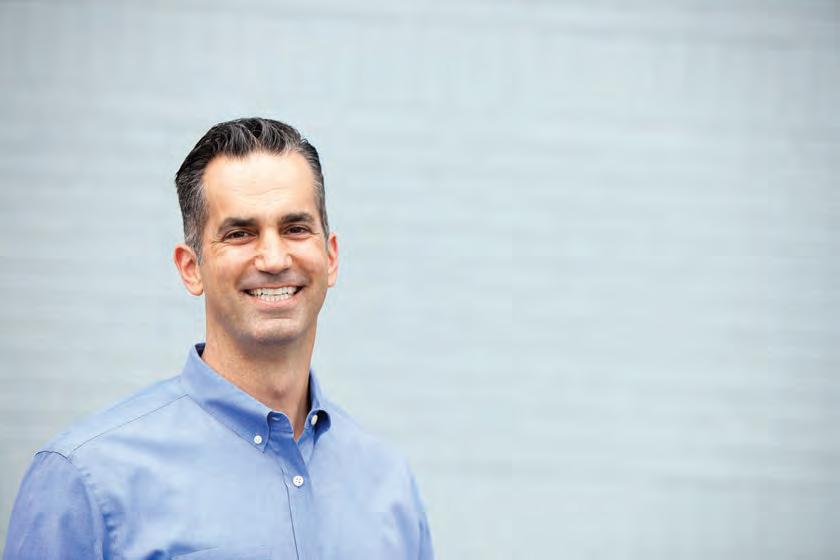
Over that time he has watched a homeless encampment in front of his home grow in size, with Lazar and his neighbors unable to get much help from the police in addressing their safety concerns, he said. It led him to again take up Taekwondo and factored into his decision to seek elected office.
“We need to build more housing,” said Lazar, who is single and lives with his cat, Jessie. He told the B.A.R. he wants “to be the YIMBY candidate and build up housing for the people living on my street.”
Several other out candidates have also launched bids for the Assembly District 6 seat being vacated by Assemblymember Kevin McCarty (D-Sacramento), who is seeking to be elected his city’s mayor next year. Evan Minton, a onetime legislative aide for Assemblymember Phil Ting (D-San Francisco), jumped into the race last week and would be the first transgender man elected to a legislative seat in California should he win.
“Making the decision to run wasn’t easy. My professional and lived experiences make me prepared to tackle the biggest challenges and continue to deliver for our community,” noted Minton, who is suing Dignity Health after one of its hospitals had suddenly canceled his scheduled hysterectomy due to his gender identity.
Also seeking the seat is Carlos Marquez, a gay married man who formerly served as executive director of American Civil Liberties Union California Action and was a senior vice president of the California Charter Schools Association.
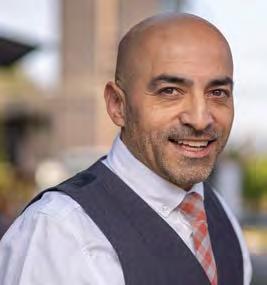
Lesbian Sacramento Municipal Utility District Director Rosanna Herber has also pulled papers to seek the seat.
Meanwhile, prosecutor Maggy Krell dropped her Sacramento mayoral bid in order to run for McCarty’s Assembly seat, and Paula Villescaz, a former school board member and new mom, is seeking the seat after losing her 2022 state Senate bid. Also in the race are fathers Sean Frame, a former school board member, and Emmanuel Amanfor, who serves on several Sacramento oversight bodies.

As for the historic nature of the race, which could result in another pink political glass ceiling being broken in the

Golden State, Lazar doesn’t think it will be much of a factor with voters of the district, which includes downtown Sacramento. Where candidates stand on various issues will be more important, argued Lazar, who launched his campaign in early July with detailed policy proposals for numerous issues on his website.
He was the first candidate last week to come out in support of the ballot measure state legislators have put before voters next fall to repeal the definition of marriage as being between a man and a woman that remains embedded in the California Constitution due to the passage of Proposition 8 in 2008. It is among the various stances he has outlined on his website in regard to LGBTQ concerns.
“I think, from what I know of this district and the three years I have been here, the district is very smart. The winning candidate will emerge not because of a label but what they bring to the table in respect of representing this district,” predicted Lazar.
With so many Democrats in the running, it is likely a Republican could also jump into the race. While they would have a shot at surviving the primary, they would be unlikely to win the decidedly Democratic district in November.
(To date, no GOP contenders are listed as having pulled papers for the seat on the candidate site overseen by the secretary of state’s office.)
Lazar told the B.A.R. he expects a GOP candidate to emerge and wouldn’t be surprised if the person is a member of the conservative Proud Boys group, as its members are active in the area, in particular, having pushed earlier this year an anti-LGBTQ agenda in the Roseville school district. Under the state’s open primary system, the top two vote-getters regardless of party affiliation advance out of the primary to the general election ballot.
It is conceivable two of the Democrats will take the top two spots in March, with a pair of the out candidates squaring off in November. But if it is a Democrat versus a Republican, the race will effectively be considered decided coming out of the primary.
“Because of the presidential primary next year, and all the Republicans will want to go out and vote for Trump, that is my calculus,” said Lazar of seeing a GOPer jump into the race. “I am trying to go up against a Republican in November. That is my goal here.”
There has yet to be an LGBTQ legislator elected to a seat in the Sacramento metro region, with the 2024 elections providing a chance to see one elected to both chambers of the state Legislature. Seeking an open state Senate seat next year is gay former West Sacramento mayor Christopher Cabaldon, a
strong candidate to win the race for the sprawling Senate District 3 seat being vacated by termed out Senator Bill Dodd (D-Napa).
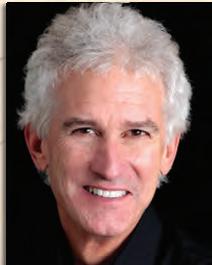
While Cabaldon has been securing support from prominent Democrats, LGBTQ leaders and groups, it remains to be seen how the AD 6 candidates fare in lining up backers who do not split their support among them. The endorsement process for the AD 6 race will be a good barometer of who may survive the primary.
Lazar has already been making the rounds of various local Democratic clubs in hopes of securing their support, he told the B.A.R. He is also trying to walk as many precincts as possible in order to introduce himself to voters throughout the district, which covers most of Sacramento, parts of Carmichael, and the unincorporated communities of Elverta, Rio Linda, Antelope, La Riviera, and Arden-Arcade.
“It is about name recognition. Everybody will have to build that,” said Lazar.



He told the B.A.R. he has modeled his campaign on his experience as director of the Mayor’s Office of Neighborhood Services, a job he held in Breed’s administration for 10 months starting in August 2018. It required him to work in the city’s neighborhoods and meet residents where they live, he noted.
“Because of that, it prepared me to go into the Assembly District, which has 500,000-plus people, and introduce myself and what I can do for this district,” said Lazar. “It was a very big learning opportunity, and I am proud of the work we did.”
Grew up in Bay Area
Raised in Sunnyvale, Lazar moved with his family when he was 10 to Santa Clara where he had been born. His mother had emigrated with her three daughters from Zacatecas, Mexico, to the Bay Area and married his father, a Tejano from Texas who had two children of his own. There is a roughly 10year age difference between Lazar and his youngest half sibling.
He graduated with an associate liberal arts degree from De Anza College in Cupertino, and earned a B.A. in political science from San Francisco State University. He spent some time trying to break into Hollywood and worked briefly as a model; it was how he landed on using the name Lex. During his time in Los Angeles Lazar interned at Leeza Gibbons’ talk show, read scripts while interning for an entertainment company, and worked at Paramount Studios.
While it was a fun experience, Lazar decided to return home to the Bay Area and figure out what he wanted to do for his career.
“I didn’t see a future there because of the lack of diversity,” recalled Lazar.
“While Los Angeles is heavily Latino, once you get behind the gates of a studio, it is not diverse at all.”
After working for several years at Trader Joe’s, Lazar got hired to work for Pelosi. Although he told the B.A.R. he isn’t interested in serving in Congress himself, his time working for the former House speaker and assisting her constituents navigate the federal bureaucracy was a defining time in his life.
“As emotionally exhausting that was, it was the most fulfilling work I ever did,” said Lazar, who hopes to secure Pelosi’s endorsement of his Assembly candidacy.t
Planning Ahead is Simple
Planning Ahead is Simple
The benefits are immense.
Planning Ahead is Simple
The benefits are immense.
When you plan your life celebration and lasting remembrance in advance, you can design every detail of your own unique memorial and provide your loved ones with true peace of mind. Planning ahead protects your loved ones from unnecessary stress and financial burden, allowing them to focus on what will matter most at that time—you.
The benefits are immense.
When you plan your life celebration and lasting remembrance in advance, you can design every detail of your own unique memorial and provide your loved ones with true peace of mind. Planning ahead protects your loved ones from unnecessary stress and financial burden, allowing them to focus on what will matter most at that time—you.
When you plan your life celebration and lasting remembrance in advance, you can design every detail of your own unique memorial and provide your loved ones with true peace of mind. Planning ahead protects your loved ones from unnecessary stress and financial burden, allowing them to focus on what will matter most at that time—you. Contact

t Politics >>
us today about the beautiful
create a lasting
at the San
Contact
ways to
legacy
Francisco Columbarium.
FD 1306 / COA 660 One Loraine Ct. | San Francisco | 415-771-0717 SanFranciscoColumbarium.com
Proudly serving the LGBT Community.
us today about the beautiful
to create a
at the San Francisco Columbarium.
Contact
ways
lasting legacy
Proudly serving the LGBT Community.
us today about the beautiful ways to create a lasting legacy at the San Francisco Columbarium.
FD 1306 / COA 660 One Loraine Ct. | San Francisco | 415-771-0717 SanFranciscoColumbarium.com
Proudly serving our Community.
Alex Lazar is seeking a Sacramento-area Assembly seat.
Barry Schneider Attorney at Law •Divorce w/emphasis on Real Estate & Business Divisions •Domestic Partnerships, Support & Custody •Probate and Wills www.SchneiderLawSF.com 415-781-6500 *Certified by the California State Bar family law specialist* 315 Montgomery St , Ste. 1025, San Francisco, CA 94104 Kurt Wagner, MFT, Ph.D. License #79845 kurtsf.com Psychotherapy for Gay Men 415-504-3130 kurt@kurtsf.com ebar.com Thanks for the pink triangle This is to let all those who worked on the pink triangle display know that it was spectacularly visible when taking a ferry from the Oakland terminal to the San Francisco Ferry Building. Thank you! Jessea NR Greenman Oakland, California Letters >>
Courtesy Alex Lazar
Leather district, SF LGBTQ center announce murals
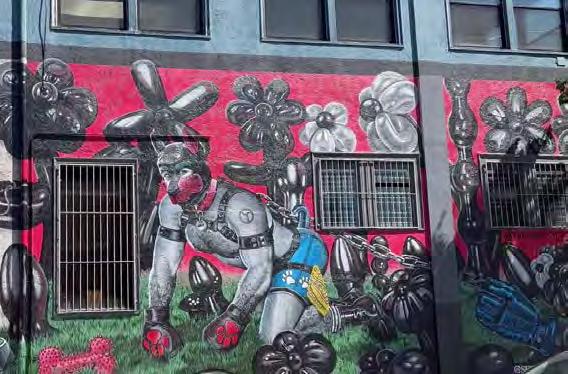 compiled by Cynthia Laird
compiled by Cynthia Laird
Anew mural has been completed on the side of Mr S Leather in San Francisco’s South of Market neighborhood while plans are underway for the next in a series of temporary murals on the exterior of the city’s LGBTQ community center.
The San Francisco Leather & LGBTQ Cultural District stated in its recent newsletter that “The Puppy,” a mural it commissioned, has been completed on the Heron Street side of Mr S Leather, 385 Eighth Street. Muralist Serge Gay Jr., a gay man, painted the mural, which is the latest of several he has done in the city, including “Never Alone” on the side of Maitri Compassionate Care hospice at 401 Duboce Avenue in the city’s Duboce Triangle neighborhood. Gay was also a collaborator on the “Showtime” mural on the exterior of Oasis, the LGBTQ nightclub at 198 11th Street.
A formal dedication of the new mural will take place Thursday, July 27, from 5 to 6 p.m., according to the leather district.
In other mural news, the San Francisco LGBT Community Center has announced the artist who will be doing their work on the exterior of the Victorian part of the building at 1800 Market Street. Alma Landeta was selected and should have their mural completed by the end of the month. According to an email announcement, Landeta is a mixed-race Cuban American queer multidisciplinary artist and educator whose work seeks to build community through the exploration of intersectional identities. Their work primarily brings attention to the importance of bodily autonomy for queer and trans people.
“I’m so excited to be chosen as the next muralist for the SF LGBT center,” Landeta stated. “This new mural, ‘Joy is the Fuel,’ is inspired by those precious and fleeting moments of joy surrounded by queer community on the dance floor.”
The mural depicts a queer dance party and speaks to how queer joy is the fuel for the community’s collective strength, the announcement noted.
Landeta was selected from a diverse pool of muralist candidates who submitted project proposals through an open callout for new mural artists in 2022, the center stated.
The mural will be unveiled Tuesday, July 25, and people are welcome to stop by between 4 and 6 p.m.
The center began its mural program after the controversial artist fnnch’s “Honey Bear” mural was defaced in April 2021 in the wake of online com-
dignity | san francisco

ments the straight artist posted likening himself to an immigrant because he came from Missouri, as the Bay Area Reporter previously reported. (He later apologized.)
After that, the center decided to embark on a series of rotating murals painted by LGBTQ artists. The first of those, “Queeroes,” was done by Juan Manuel Carmona and Simón Malvaez in May 2021; it was recently painted over with a coat of white paint in preparation for the new mural by Landeta.
New music series at LGBT center
Dirty Habit, the award-winning restaurant and bar located on the fifth floor of Hotel Zelos in the city’s South of Market neighborhood, has partnered with the San Francisco LGBT Community Center’s cultural department to launch a new monthly music series that promotes and supports Black Indigenous people of color artists.
The new program, Vibin’ Live, features live performances at Dirty Habit, 12 Fourth Street, every third Thursday from 6:30 to 9:30 p.m., beginning July 20. Admission is free with a dinner reservation.
“We are thrilled to partner with the SF LGBT center to launch this new series,” Desiree Hemmelgarn, director of sales and marketing at Hotel Zelos, stated in a news release. “It’s a privilege to be able to provide a platform for the center’s bud ding local artists. We think our guests will be blown away by the remarkable musicians that are based right here in the Bay Area.”
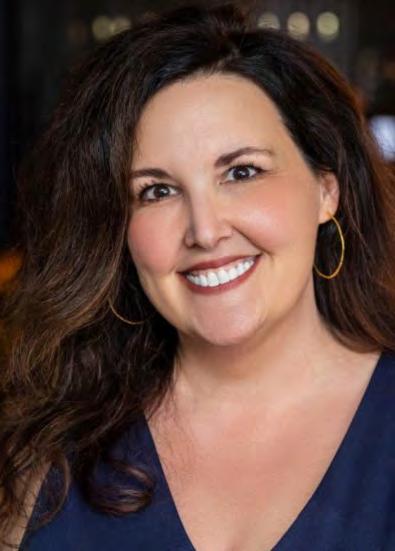
Timothy Hampton, associate director of cultural programs at the center, stated that the new program is a great opportunity for the artists “to reach even more people with their artistry.”
The inaugural performance will feature singer-songwriter Tyler Reese. The release noted that she is finding her home in next wave R&B and neo-soul.
For more information about Dirty Habit, visit https://tinyurl. com/2p8eebrm. For more information on the LGBT center, visit sfcenter.org
Health fair in the Tenderloin
San Francisco Community Health Center will hold a summer health and wellness fair in the Tenderloin Friday, July 21, from 1:30 to 4 p.m. at the agen-
<< Drag
From page 1
said Jones, who will be among those performing. “After Texas passed its own drag ban, we felt that was the natural next focus for the group.”
It also happens to be the home state of collective member Juicy Liu, the drag queen alter ego of Michael Nguyen. The patent attorney has worked in the Bay Area now for 15 years.
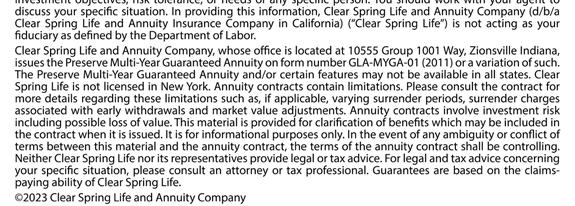
“As a recovering Texan, I know the importance of these vital LGBTQI+ nonprofits doing the hard work on the ground,” stated Liu, 41, a co-founder of Legalize Drag. “It breaks my heart to
cy’s Tenderloin headquarters, 730 Polk Street. The agency, which also operates a health clinic in the San Francisco LGBT Community Center, opened its Tenderloin trans services center in March, as the B.A.R. previously reported. The Tenderloin Summer Health and Wellness Fair is tailored for those who are experiencing homelessness and for trans and gender-nonconforming people, a news release stated. The event will offer dropin medical services and HIV/HCV testing, education on gender-affirming care, free clothing and hygiene supplies, harm reduction supplies, wellness and personal care services, and food and entertainment. Pets and furry friends are welcome, the release noted.
“Our summer health fair is a great opportunity for community members to get to know our services and our team in a safe, friendly, and fun setting,” stated Miguel Ibarra, the agency’s director of community engagement.
For more information, go to sfcommunityhealth.org.

Meals on Wheels SF has new CEO Meals on Wheels of San Francisco, which provides nutritious meals to homebound seniors in San Francisco and Northern San Mateo counties, has announced the appointment of Jennifer Steele as its new chief executive officer. Steele, a straight ally, has started in the position and replaces Ashley McCumber, a gay man who led the agency from 2007 until he stepped down last year to return to his native North Carolina, where he is leading the Food Bank of Central and Eastern North Carolina.
A news release from Meals on Wheels SF stated that Steele has a record of accomplishment in the nonprofit sector that spans nearly 20 years and extensive expertise with Meals on Wheels programs.

Steele joins MOWSF from Meals on Wheels of Southwest Ohio and Northern Kentucky where she served as the CEO for nearly five years. During her tenure, she successfully expanded the organization’s reach, increased donor engagement, and implemented innovative programs to better serve the community, the release stated. Under her guidance, the organization experienced tremendous growth and impact.
know that I can be arrested for performing a centuries-old art form because rightwing extremists need a new boogeyman to mobilize their base. It is simply unAmerican and unconstitutional to ban drag – I now fear for my safety as a drag performer when I’m visiting Texas.”
Helping to promote the benefit has been Itzel Abrego, 45, who performs as two-spirit drag king Papi Churro and has known Jones for a while, even pet sitting for them. A parent of four young adult children, the youngest of whom lives with them in Oakland, Abrego left Austin for the Bay Area in late 2021 in order to be closer to their partner.
Despite it meaning they would be giving up their career as a full time drag
“We are confident that Jennifer’s extensive experience, passion, and innovative thinking will lead our organization to new heights,” stated José Allen, board chair of MOWSF. “With her leadership, Meals on Wheels of San Francisco will expand its reach, strengthen partnerships, and continue to provide homedelivered meals and vital services to older adults in the Bay Area.”
The release stated that Steele is an accomplished lecturer and industry thought leader and has served on national, state, and local boards and legislative oversight committees, including current service on the National Board of Meals on Wheels America. She has been honored with numerous awards for her service to the community, including Outstanding Woman of Northern Kentucky from the Northern Kentucky Chamber of Commerce and the VUCA Award for Vision, Understanding, Clarity, and Agility from the Leadership Council for Nonprofits.
“I am truly honored and excited to join Meals on Wheels of San Francisco as its new CEO,” stated Steele, who was in town this week to meet with agency staff, clients, and board members. “It is an iconic organization providing critically important nutrition, meals, and human connection to older adults in need. I look forward to working with the dedicated staff, volunteers, and supporters to maximize our impact in the community.”
Steele received her bachelor’s degree in social work and master’s degree in public administration from Northern Kentucky University. She went on to earn the financial success for nonprofit organizations certificate from Cornell University in 2011; a certificate in business innovation through IDEO, an online learning site, in 2022; and is currently enrolled in the entrepreneurship and innovation certificate program through Harvard Business School Online.
A MOWSF spokesperson said the agency does not release salary information, other than what is required on federal 990 forms. According to its 2022 Impact Report, the agency had revenue of just over $24 million and expenses of $27 million. According to the 2021 Form 990, McCumber’s total compensation was $397,431.
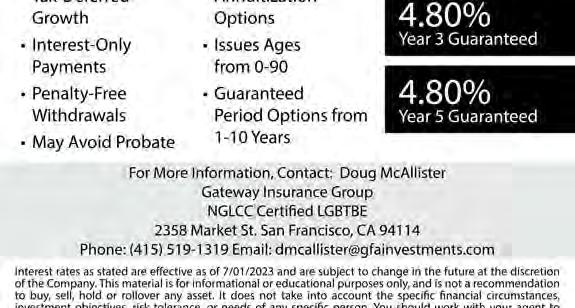
Donate old phones at SF Zoo
The San Francisco Zoo now has the ability to accept donations of old cellphones, iPads, tablets, Apple watches, and more.
An email announcement stated that for its Gorillas on the Line program, the zoo is partnering with ECO-CELL, an electronics recycling company, to tally and recycle old electronic devices, with a portion of the funds generated through the recycling going to the Association of Zoos and Aquariums’ Gorilla SAFE, the Dian Fossey Gorilla Fund and the Wildlife Conservation Society for support of on-ground protection of Grauer’s and cross river gorillas.
Items can be donated in the designated collection bin located in the membership concierge office at the zoo, located at Sloat Boulevard and the Great Highway.
For more information about the zoo, go to sfzoo.org. t
performer in their home state of Texas, Abrego felt it would be safer to live in California. They had been the target of anti-LGBTQ harassment after the public library in Leander, Texas, invited Abrego to host a drag story hour in August 2019 and then disinvited them due to the controversy.
A member of a conservative group in the state had begun a campaign to cancel the event, which was covered by disgraced conspiracist Alex Jones on his InfoWars program and then picked up by mainstream media outlets. With their private information doxxed online, Abrego for a time had moved into a
See page 11 >>
8 • Bay area reporter • July 20-26, 2023 t
<< Community News Are you looking for a spiritual experience as unique as you? Come and see Dignity/SF, which affirms and supports LGBTQ+ folks. Catholic liturgy Sundays at 5pm, 1329 7th Avenue (Immediately off the N Judah line)
for the service and stay for the fellowship. dignitysf@gmail.com for more details Instagram @dignitysanfrancisco † Facebook @DignitySF
Come
Serge Gay Jr.’s “The Puppy” mural on the side of Mr S Leather will be dedicated July 27.
Courtesy SF Leather & LGBTQ Cultural Center
New Meals on Wheels San Francisco CEO Jennifer Steele
Courtesy MOWSF
New global AIDS report shows uneven progress
by Liz Highleyman
There is a clear path to ending AIDS, and some countries have made great strides, according to the latest UNAIDS update released July 13 ahead of the International AIDS Society Conference on HIV Science in Brisbane, Australia. But inadequate funding and discrimination against key affected populations – including LGBTQ people – are impeding progress.
“The message [of the new report] is hopeful, but it is not the relaxed optimism that might come if all was heading as it should be. It is, instead, a hope rooted in seeing the opportunity for success, an opportunity that is dependent on action,” stated UNAIDS Executive Director Winnie Byanyima. “The end of AIDS is an opportunity for a uniquely powerful legacy for today’s leaders. They could be remembered by future generations as those who put a stop to the world’s deadliest pandemic. They could save millions of lives and protect the health of everyone.”
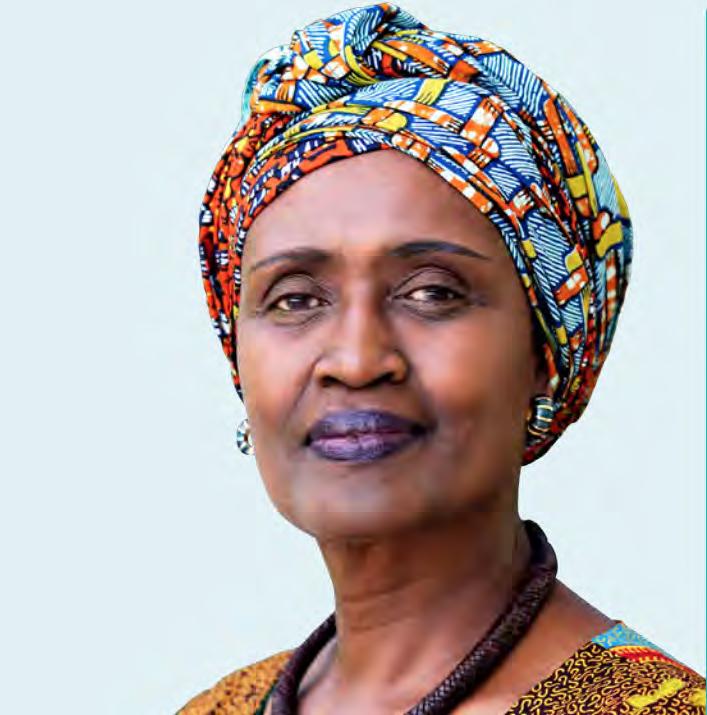
Further progress depends on following the evidence, tackling inequalities, enabling community organizations to play their vital role, and ensuring sufficient and sustainable funding, Byanyima said at a UNAIDS briefing to unveil the report, entitled “The Path that Ends AIDS.”
Some 39 million people worldwide were living with HIV in 2022, according to the report. Nearly 30 million of them were on antiretroviral treatment, up from just 7.7 million in 2010. An estimated 1.3 million people were newly infected and 630,000 died from AIDSrelated illnesses in 2022, bringing the total number of HIV cases to 86.6 million and total AIDS deaths to 40.4 million since the start of the pandemic. New infections have fallen by 59% from a peak of 3.2 million in 1995, while AIDS deaths have dropped by 69% from their peak of 2 million in 2004.
But progress is uneven. New HIV infections are rising in Eastern Europe and Central Asia, the Middle East and North Africa, and some countries in Asia and the Pacific, primarily due to a lack of prevention services for marginalized populations and barriers imposed by punitive laws and social discrimination, the report states.
Botswana, Eswatini, Rwanda, Tanzania, and Zimbabwe have already achieved the UNAIDS 95-95-95 targets, meaning 95% of people living with HIV know their status, 95% of those are on treatment, and 95% of treated people have achieved viral suppression. Sixteen other countries – half of them in hardhit sub-Saharan Africa – are close to reaching these goals.
But other countries are lagging be hind, bringing down global percent
ages. Worldwide, an estimated 86% of HIV-positive people knew their status in 2022, leaving 5.5 million unaware that they have the virus. For the second target, 89% of people who knew their status, but just 76% of all people living with HIV were on antiretrovirals at the end of last year, leaving more than 9 million untreated. Finally, 93% of people on treatment, but only 71% of HIV-positive people overall, had achieved viral suppression.
The United States has not yet reached the UNAIDS 95-95-95 targets, though
is not straightforward because the Department of Public Health uses different metrics than UNAIDS. Based on the city’s latest HIV epidemiology annual report, 97% of all residents living with HIV knew their status, 77% had received care, and 70% had an undetectable viral load in 2021. Citing DPH data, the Fast Track Cities website (https://fast-trackcities. org/training/san-francisco) reports that 94% of people who were on treatment achieved viral suppression.
Discrimination impedes progress
Key populations, including adolescent girls and young women, gay and bisexual men, transgender people, people who use drugs, and sex workers continue to face stigma, discrimination and, in some cases, criminalization that keeps them from accessing the tools they need to prevent and treat HIV, the report states.
Worldwide, just over half of people living with HIV are women and girls, driven by high incidence (new cases) and prevalence (total cases) in Africa.
UNAIDS estimates that some 4,000 adolescent girls and young women acquire HIV every week, three quarters of them in sub-Saharan Africa.
While less than 1% of the global adult population is living with HIV, prevalence is much higher among key populations. Some 10% of transgender people, 8% of gay and other men who have sex with men, 5% of people who inject drugs, and nearly 3% of sex workers are HIV-positive, according to the UNAIDS report.
A new law in Uganda that includes long prison sentences for same-sex relations and even for “promoting”
fabric of a lot of African societies,” Keith Zenga King, a queer activist and writer in Uganda, said at the UNAIDS briefing. “In regard to HIV response, these laws deeply affect trans and gender-nonconforming people who have already been marginalized and minoritized.”
Yana Panfilova of Ukraine, founder of the Eastern European and Central Asian youth advocacy group Teenergizer, added, “In some countries, it can feel safer to live in the shadows as a person living with HIV, as a refugee, or as a gay person than accessing the health services you need.”
Inequalities that undermine the health and well-being of marginalized communities also threaten the HIV response in the United States, where new diagnoses among Black people are four times higher than those among people from other racial and ethnic groups, according to the report.
The good news is that several countries have recently rescinded harmful laws, including five that decriminalized same-sex relations in 2022 or 2023 (Antigua and Barbuda, the Cook Islands, Barbados, Saint Kitts and Nevis, and Singapore).

Funding for HIV declined last year, falling back to the same level as 2013, the report notes. UNAIDS estimates that approximately $29.3 billion will be needed by 2025 to get the response back on track in low- and middle-income countries, but only $20.8 billion was available at the end of 2022.
“The new data released today by UNAIDS makes it clear that with strong political leadership and adequate funding, we can end AIDS as a public health threat,” said Peter Sands, executive director of the Global Fund. “To achieve that
July 20-26, 2023 • Bay area reporter • 9 t
Health News >>
UNAIDS Executive Director Winnie Byanyima Courtesy UNAIDS
Springs City Councilmember Lisa Middleton. The Democrat is running next year against Ochoa Bogh for the newly drawn 19th Senate District seat that includes the LGBTQ tourist and retirement mecca in the Coachella Valley.
She issued a statement last Friday saying she was “deeply disappointed” her opponent abstained from the vote. Coincidentally, the same day that ACA 5 passed out of the Senate, Ochoa Bogh officially kicked off her 2024 campaign bid.
“Our marriages matter. My wife and I celebrate the love and union of other couples. Senator Ochoa Bogh, when given an opportunity to stand up for the marriages of thousands of her constituents, chose silence. I will not be silent,” stated Middleton.
If elected, Middleton would become the first trans member of the Legislature’s upper chamber; two trans candidates are also seeking to be the first elected to the Assembly next year. Having the Prop 8 repeal measure on the 2024 fall ballot could help bolster her chances in the Senate race by drawing
Past contenders
“I wouldn’t say difficult, but it has been a challenge,” Ammiano, 81, told the Bay Area Reporter in a phone interview of why no out candidate has been elected mayor. “There’s no one reason or one candidate. The blame game doesn’t work. There are systemic obstacles.”
Leal, 73, told the B.A.R. that in her case, it was the lack of money.
“I raised $800,000 when I ran, which is a lot, to me,” she noted.
But Newsom had garnered broad name recognition the year before, in 2002, with his Care Not Cash ballot measure that reduced general assistance payments to eligible city residents with the promise of providing vouchers for food and shelter. It passed with nearly 60% of the vote. Political action committees aligned with Newsom raised millions in his 2003 mayoral race.
In 2011, Bevan Dufty, a gay man and former supervisor of District 8, which includes the LGBTQ Castro neighborhood, lost to Lee, who in January of that year had been appointed mayor after Newsom was elected lieutenant governor. Lee had promised the Board of Supervisors, which voted on the appointment, that he would be a caretaker mayor and not seek election. But as the filing deadline drew close that August, Lee reneged on his pledge and entered the race after a “Run, Ed, Run” move-
more LGBTQ and progressive voters in Riverside and San Bernardino counties to the ballot box.
“An overwhelming majority of Californians across the political spectrum support this policy. Senator Ochoa Bogh’s failure to support basic civil rights for the LGBTQ+ community and for interracial couples is disqualifying,” stated Middleton.
ACA 5 does not require Governor Gavin Newsom’s signature to be placed on the November ballot next year, though the governor is likely to support it and play a key role in the campaign to pass the repeal measure. After all, Prop 8 stemmed from his action back in February 2004, when he was mayor of San Francisco, to order city officials to ignore state statutes and marry same-sex couples.
What was dubbed the “Winter of Love” spawned a decade-long legal battle over marriage equality in California. Although the California Supreme Court annulled the marriages performed in 2004, the justices ruled in the spring of 2008 that same-sex couples had a right to wed.
Many rushed to exchange wedding vows before the November election that
ment took hold.
“In my race, it was so unusual that we had an interim mayor who had proclaimed not to run,” Dufty, 68, told the B.A.R. “He decided pretty late in the process and most of us were running and accepted public funds. If we dropped out we had to repay those funds we raised.”
Leno’s effort in 2018 was the last one by a serious out candidate running for San Francisco mayor. He, too, attributed his loss to money, specifically the socalled dark money that PACs raise on behalf of a candidate without having to disclose donors.
“It’s much harder for a change candidate to compete with that,” Leno, 71, told the B.A.R. in a phone interview. Campaigns can raise a maximum of $500 per donor, and those contributions are disclosed, but the unlimited PACs often materialize and donors’ names are not reported.
“Our campaign tagline was ‘Shake up City Hall,’” he said.
Lots of challenges
The out former mayoral candidates offered up various reasons about why it’s so hard to wage a successful campaign.
Achtenberg and Ammiano, in separate interviews, both brought up the fact that the LGBTQ community “is not a monolith.” Ammiano ran from the progressive end of the political scale. Achtenberg ran in part to show that a woman could be mayor of San Francisco.
“In my case, many women had been elected supervisor but only Dianne
DISPLAY OBITUARIES & IN MEMORIAMS
fall because of the ballot measure known as Prop 8. It aimed to define marriage as being between a man and a woman in the state’s constitution, thus halting the same-sex marriages. Voters ended up narrowly adopting Prop 8 in November 2008, leading to several legal challenges being filed with the state courts over its constitutionality.
Yet the state supreme court issued a ruling on May 26, 2009, upholding Prop 8 with a 6-1 decision. It would take another four years for the federal courts to overturn that ruling in the case of Perry v. Schwarzenegger, which had first been heard by a district court in San Francisco.
In June 2013 the U.S. Supreme Court let stand rulings by lower federal courts that had found Prop 8 to be unconstitutional. With same-sex couples once again allowed to wed in California, the ballot measure pushed by anti-LGBTQ groups and conservative leaders largely receded from many peoples’ minds.
That is until last summer, when the conservative majority on the U.S. Supreme Court rescinded a federal right to abortion. The ruling alarmed LGBTQ advocates in California, who feared seeing the nation’s top court also reexamine
its 2015 decision in Obergefell v. Hodges that established a federal right to marriage for same-sex couples.
Should that ruling be reversed, it could revive Prop 8’s “zombie language” that remains embedded in the California Constitution. With that fear in mind, the state’s LGBTQ legislators and their allies decided to wage one more ballot box fight over the issue of marriage equality.
It led to the introduction this legislative session of ACA 5 in order to safeguard marriage rights for same-sex couples in California from any future legal attacks at the national level. Already pledging their support to help pass ACA 5 next year are spouses Ruth Borenstein and Karen Strauss.
Unable to marry in the summer of 2008 prior to Prop 8’s passage for family reasons, the Noe Valley couple agreed to take part in one of the lawsuits filed with state courts seeking to have it be deemed unconstitutional. They became the lead plaintiffs in Strauss v. Horton and, while they lost that legal fight, the women were able to finally wed in the summer of 2013.
“I never really thought about the fact that Prop 8 was still there. It didn’t get
repealed somehow, not withstanding all the good case law that said that it was invalid,” Borenstein recently told the Noe Valley Voice monthly newspaper. “Once I understood this was just like those terrible abortion bans that would kick back into life, I knew we had to do something.”
Borenstein is optimistic of seeing ACA 5 be passed. It requires majority approval from California voters to amend the constitution and excise Prop 8’s language from the document.
In the coming months, a broad coalition of civil rights organizations and labor groups, including Equality California, will launch a statewide campaign to secure passage of ACA 5.
“Today is a historic day for our community, for California, and for the cause of justice and equality everywhere,” stated Equality California Executive Director Tony Hoang. “California should always protect fundamental civil rights for all people and ACA 5 is a critical step toward fulfilling that commitment. This wouldn’t be possible without the broad bipartisan support and commitment to love and fairness of our partners in the Legislature.” t
The Bay Area Reporter can help members of the community reach more than 120,000 LGBT area residents each week with their display of Obituary* & In Memoriam messages.
RATES: $21.20 per column inch (black & white) $29.15 per column inch (full color)
DEADLINES: Friday 12noon for space reservations Monday 12noon for copy & images
TO PLACE: Call 415-829-8937 or email advertising@ebar.com
* Non-display Obituaries of 200-words or less are FREE to place. Please email obituary@ebar.com for more information.
Feinstein had been elected mayor and the only way she got there was because [then-mayor George] Moscone was killed,” Achtenberg, 72, said.
Feinstein was president of the Board of Supervisors at the time of the November 1978 assassinations of Moscone and gay supervisor Harvey Milk. As board president, she was named interim mayor and went on to win election in her own right. (Feinstein is now the state’s senior U.S. senator and announced earlier this year that she would not seek reelection in 2024.)
“We’re not a monolith. There was a faction of the community that thought it was racist of me to run against Willie Brown,” she said. Brown is Black.
“Our Bay Area community politically is not as identified [as just LGBTQ] any longer, either by ourselves or by others,” Achtenberg said.
Like Achtenberg, Leno also ran against a Black candidate; Breed is the first Black woman to be mayor of San Francisco.
Ammiano pointed out that Milk, who had run twice for supervisor unsuccessfully before winning in November 1977, built a coalition with Asians, women, and seniors, among others.

“That intersectionality is not easy to attain,” he said. “It’s a tightrope.”
“We’re not a monolith with ‘the gay vote,’” Ammiano added.
Dufty said that in his race, he made a decision not to attack Lee, the first Asian American to hold the office of mayor, as some of the other candidates were doing. “We ran as hard a campaign as we could,” he said.
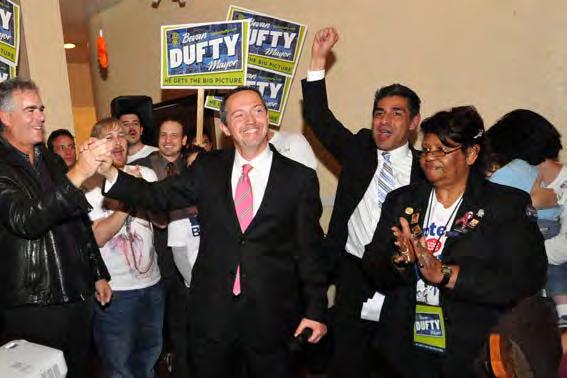
After Lee won the race, Dufty worked for his administration for a time as director of the Housing Opportunity, Partnerships and Engagement program. He eventually retired from that position and went on to become an elected member of the board that oversees the BART regional transportation system.
The B.A.R. reported last week that Dufty won’t seek reelection to that position next year, nor will he run for mayor.


Leno, too, said he would not run for
mayor in 2024. “I can tell you that quite certainly,” he said.
Leno also pointed to Milk’s campaign, and noted he wasn’t the only gay person seeking what was then the District 5 supervisor seat that included the Castro. Rick Stokes, a more conservative gay man, also ran in that race. Stokes cofounded the Steamworks Baths, which is now involved in a tangled ownership lawsuit, as the B.A.R. recently reported. Stokes died in 2022.“It was so novel and revolutionary,” Leno said of Milk’s campaign. “There was such a fervor around Harvey, and I don’t sense that today.”
Thoughts on current mayor
The out former mayoral candidates had some thoughts on Breed, the current mayor, who’s up for reelection in 2024. At this point, it doesn’t appear there will be a serious challenger from the LGBTQ community in that race. So far, District 11 Supervisor Ahsha Safaí, a straight ally, has announced he’s running. This week the San Francisco Standard reported that Daniel Lurie, a straight man who’s the founder of the anti-poverty nonprofit Tipping Point and an heir to the Levi Strauss fortune, intends to challenge Breed in next year’s race.
Achtenberg, who supported Breed in 2018, said she thinks the mayor is doing a good job.
“I admire her leadership,” she said. “She’s bold when she needs to be bold.”
Keeping the streets clean and people safe are top priorities, “and she and Peskin are trying to compromise on housing,” Achtenberg said, referring to Board of Supervisors President Aaron Peskin, who represents District 3 and has been mentioned as a possible mayoral candidate next year since he will be termed off the board in early January 2025.
“These are tough times,” Achtenberg said, adding that Breed did a “particularly good job when she led us through COVID.”
Achtenberg went on to serve on the California State University Board of Trustees for 16 years, including a stint as chair. These days she is serving as a consultant to the board, which recently
hired its first Latina chancellor, Mildred Garcia, who has a doctorate in higher education.
Leal, who supported Leno in the 2018 race, gave Breed credit.
“I really wanted him to win,” Leal said of Leno. “But I think she works real hard with the cards she’s been dealt.”
Leal suggested Breed meet with chief deputies of city departments in addition to her meetings with department heads.
“City departments are going to spin you around like a top,” Leal said, referring to department heads. “I think she’s starting to figure it out.”
In addition to overseeing the treasurer’s office, Leal was also general manager of the San Francisco Public Utilities Commission from 2004-2008. She now works as a consultant on water and climate issues and joined Harvard University as a senior fellow in its advanced leadership institute.
“By the time I left they were well run,” Leal said of the two departments she managed. The mayor, she said, needs to reach into departments “and figure out who’s moving things, or not. Or do they do what they’ve been doing for the last 20 years?”
Dufty noted that Breed once served as his intern when he ran the mayor’s neighborhood services office under Brown. But he, too, supported Leno in 2018. Since then, Dufty said he has sought to work with Breed. He recently became a member of the city’s new homelessness oversight commission, which voters approved last November and which Breed opposed.
“I have empathy for the unprecedented times she’s walked into,” Dufty said.
He said the perception that Breed is in a weak position going into her reelection might be overstated. “I won’t believe that until some polling comes out,” he said.
Homelessness continues to be the city’s top concern, he noted. “The public does not believe San Francisco can impact homelessness,” he said.
Leno was more circumspect. “The status quo of the past generation of city leadership has led us to where we are to-

10 • Bay area reporter • July 20-26, 2023 t << From the Cover
<< Prop 8 From page 1 <<
page 1 See page 11 >>
From
Former supervisor Bevan Dufty joined supporters to await election returns on November 8, 2011.
Rick Gerharter
Former supervisor Tom Ammiano encouraged supporters to vote for him during the 1999 mayoral race.
Rick Gerharter
day,” he noted.
Ammiano, unsurprisingly, is not a fan of Breed’s.
“I’m dissatisfied,” he said. “I wish there was less pay to play and more progressive issues coming from the mayor’s office. I hope there is a strong candidate to challenge her.”
Breed did not respond to a request for comment through her office. She will be having a birthday party campaign fundraiser Saturday, August 5, from noon to 2 p.m. at the Sixth Avenue Skatin’ Place in Golden Gate Park. Tickets start at $50.
Impact of out candidates
The out gay men and lesbians who’ve run for San Francisco mayor have had an impact on the city. Ammiano, for one, said that he has no misgivings.
“I’ve never regretted running for mayor because we did push the needle and district elections came out of it,” he said. San Francisco had district elections for supervisor for many years but after the assassinations of Milk and Moscone, the supervisors were elected citywide. Five or six seats on the 11-member board were up each cycle and the top vote-getter was named board president.
friend’s home at their insistence until the story had died down.
“Now I look back at it as the calm before the storm. Now that all this stuff is happening, they were setting everything up it felt like,” recalled Abrego, who turned their ordeal into a drag act where they impersonated Jones.
Another factor in their decision to leave Texas was the state’s loosening of its gun laws, allowing people to carry firearms out in public. As a person of color it no longer felt safe going anywhere outside of Austin, Abrego told the Bay Area Reporter in a recent interview.
“It got to the point my home wasn’t any longer my home. It sucked because it was my grandfather’s land,” said Abrego, who is a member of the Coahuiltecan and Nahua/Otomi tribes. “So it was not safe, and I was worried.”
One Texas friend of theirs took their own life due to the oppression they were facing, as did a friend from Tennessee. Abrego has chosen family who are transgender people still living in Texas now trying to move out of the state, while other friends are choosing to stay and fight.
“I have friends that don’t want to
Legals>>
In 1996, voters passed Proposition G, which re-established district elections beginning in 2000.
Achtenberg, Ammiano, and Leal all ran for supervisor in the citywide elections. Dufty and Leno ran after district elections were reestablished.
Achtenberg said she does not like district elections. “I am not a fan,” she said.
“In a parochial city district elections make representation even more paro-
have to move because of this legislation. They don’t want to be bullied out of there so they are fighting,” said Abrego, who works full time now as an office manager for the San Francisco nonprofit Renaissance Entrepreneurship Center. “I have a lot of amazing activist friends turning into big warriors out there, and I want to help.”
Beneficiaries
One of the beneficiary agencies of the upcoming drag benefit is Equality Texas and its Queer Texas Crisis Fund.
CEO Ricardo Martinez, a gay man who grew up in New York and has familial ties to Texas, told the B.A.R. the statewide nonprofit has received financial assistance this year from several businesses located in other states, such as San Francisco law firm Keker Van Nest & Peters LLP, because of the legislative assault on LGBTQ Texans’ civil rights.
“I understand why people would have pity on us. I want to note that is because they are concerned from the stuff they hear, and what they hear isn’t wrong,” said Martinez, 41, who’s led his nonprofit for four years. “I think they are right to be fearful of what is happening on our behalf.”
In addition to the record number of anti-LGBTQ bills being filed by Texas lawmakers – there were 141 in 2023 that Equality Texas deemed to be bad
in a civil case. The court’s lien must be paid before the court will dismiss the case.
¡AVISO! Lo han demandado. Si no responde dentro de 30 días, la corte puede decidir en su contra sin escuchar su versión. Lea la información a continuación.
Tiene 30 DÍAS DE CALENDARIO después de que le entreguen esta citación y papeles legales para presentar una respuesta por escrito en esta corte y hacer que se entregue una copia al demandante. Una carta o una llamada telefónica no lo protegen. Su respuesta por escrito tiene que estar en formato legal correcto si desea que procesen su caso en la corte. Es posible que haya un formulario que usted pueda usar para su respuesta. Puede encontrar estos formularios de la corte y más información en el Centro de Ayuda de las Cortes de California (www.sucorte.ca.gov), en la biblioteca de leyes de su condado o en la corte que le quede más cerca. Si no puede pagar la cuota de presentación, pida al secretario de la corte que le dé un formulario de exención de pago de cuotas. Si no presenta su respuesta a tiempo, puede perder el caso por incumplimiento y la corte le podrá quitar su sueldo, dinero y bienes sin más advertencia. Hay otros requisitos legales. Es recomendable que llame a un abogado inmediatamente. Si no conoce a un abogado, puede llamar a un servicio de remisión a abogados. Si no puede pagar a un abogado, es posible que cumpla con los requisitos para obtener servicios legales gratuitos de un programa de servicios legales sin fines de lucro. Puede encontrar estos grupos sin fines de lucro en el sitio web de California Legal Services, (www.lawhelpcalifornia.org), en el Centro de Ayuda de las Cortes de California, (www.sucorte.ca.gov) o poniéndose en contacto con la corte o el colegio de abogados locales. AVISO: Por ley, la corte tiene derecho a reclamar las cuotas y los costos exentos por imponer un gravamen sobre cualquier recuperación de $10,000 ó más de valor recibida mediante un acuerdo o una concesión de arbitraje en un caso de derecho civil. Tiene que pagar el gravamen de la corte antes de que la corte pueda desechar el caso. The name and address of the court is: (El nombre y direccion de la corte es): Hon. Howard G. Gibson Courthouse, 10820 Justice Center Dr, Roseville, CA 95678. The name, address, and telephone number of plaintiff’s attorney, or plaintiff without an attorney, is: (El nombre, la direccion y el numero de telefono del abogado del demandante, o del demandante que no tiene abogado, es): CRAIG HILT, 22313 TODD VALLEY RD, BOX 583, FORESTHILL, CA 95631;
chial,” Achtenberg said.
That was something Leal alluded to in an interview. When she served on the Board of Supervisors, she would get inquiries from constituents all over San Francisco, as did her colleagues. Now, people mostly contact their district supervisors.
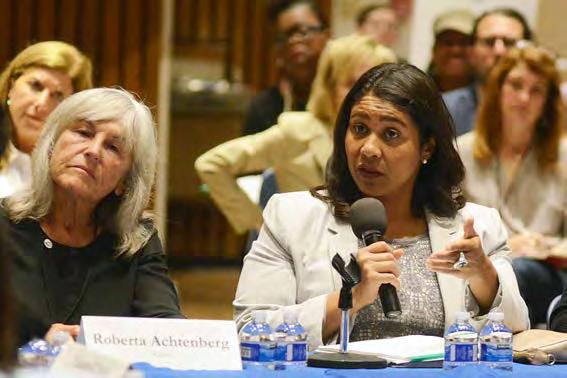
Dufty said that there could be an example of an out candidate unifying the city, though not for mayor. Gay state Senator Scott Wiener (D-San Francisco)
– candidates are increasingly running on an anti-LGBTQ platform, noted Martinez, while “vigilante, extremist” parent groups are targeting school policies and others “invade” safe spaces like drag brunches.
“But I think we have thousands of people across Texas who are fighting,” he said. “We know 70% of Texans believe discrimination against us and our community is wrong. We need them to practice this love into action.”
His agency employs 14 people, all but one full time, on a budget this year of nearly $2 million. Working with a coalition of pro-LGBTQ groups in the state, Equality Texas successfully opposed 95% of the bad bills it tracked this legislative session, noted Martinez.
Having financial support, such as from events like the San Francisco fundraiser, is essential for his agency and its nonprofit partners to continue doing the work they are doing, added Martinez.
“We have a success rate that is pretty high. But we are only able to do it if we are resourced up enough to do it, because the fight is so big and we are pretty small organizations,” he said.
One such agency is Organización Latina Trans Texas based in Houston, which employs two full time employees and operates on a budget of roughly $250,000. It will receive a portion of the
earlier this year opened an exploratory committee for the city’s congressional seat. If Congressmember Nancy Pelosi (D-San Francisco) decides not to seek reelection next year, Wiener has said he would run.
“It would be a great building block for breaking the glass ceiling,” Dufty said of Wiener’s potential run. There hasn’t been an out member of Congress from San Francisco either. (The gay late supervisor Harry Britt did run for Congress in 1987, but narrowly lost to Pelosi, who has held the seat ever since.)
Dufty pointed out that when Wiener served as District 8 supervisor, he was viewed as a moderate. But since moving on to the state Legislature, Wiener has increasingly – and successfully – taken on controversial progressive issues such as reforming the state’s sex offender registry, Dufty said. The law, which Newsom signed in 2020, did not change any criminal statutes. Rather, it ensures LGBTQ adolescents are treated the same as their heterosexual peers when faced with the possibility of being listed on the state’s sex offender registry.
Wiener was targeted with online harassment by QAnon conspiracy theorists and anti-Semites over that Senate Bill 45, as the B.A.R. previously reported. He has received death threats in recent years.
money raised at the San Francisco event.
“We focus really hard on expanding the organization or expanding the people who are doing the work,” said Gia Pacheco, a transgender Texas native who is the agency’s program coordinator.
Pacheco, who turns 33 the same day as the drag benefit, told the B.A.R. her agency has also been receiving more support from people out of state this year.
“It is very nice to see that we are not alone here in the dark state of Texas,” she said. “People outside of Texas are taking notice and interested in helping. Unfortunately, we are in a dire situation at the moment.”
Her agency runs the only shelter for trans people in Texas, said Pacheco, with room for 20 people at a given time. It is open to anyone from the LGBTQ community and currently houses 10 individuals, some of whom are Latino/a immigrants.
“If we don’t take them in, no one else will,” said Pacheco. “A lot of shelters send trans individuals who go to them for help to us. They don’t have the capacity to house them and keep them safe.”
The legislative fights have her and other trans adults in Texas on edge, said Pacheco, as they now fear their access to gender-affirming health care will be the next to be restricted.
“I believe he will unify our community and like to believe down the road there will be a gay mayor in San Francisco,” Dufty said.
Wiener told the B.A.R. that the city’s LGBTQ political strength has ebbed and flowed over the years.
“Our community has had a lot of ups and downs politically in San Francisco,” he said in a brief phone interview. For example, from the time Rafael Mandelman joined the Board of Supervisors in July 2018 until last May, he was the only out member of it. He was then joined by gay District 6 Supervisor Matt Dorsey, whom Breed appointed to fill the seat of former supervisor Matt Haney, a straight ally who won election to the state Assembly. Dorsey went on to win a full four-year term last November, as did gay District 4 Supervisor Joel Engardio, who defeated former supervisor Gordon Mar, a straight ally.
Wiener said the LGBTQ community, like others in the city, has been divided at times over the years.
“When we are united, or at least less divided, we are very, very strong,” Wiener added.
Ammiano thinks the city will one day have an LGBTQ mayor.
“I kind of think, in the end, we will have a queer mayor,” he said.t
“A lot of times, especially people my age, they think this is not affecting them because they are not a minor. But that was their first step,” Pacheco said of the Republicans who control the state government. “If they see they can do it for youth, there is nothing stopping them from stopping adults from getting health care in the state of Texas. There is nothing stopping them to reverse name and gender maker changes on state IDs.”
A third Texas agency, the Black Trans Leadership of Austin, will also share in the proceeds raised via the San Francisco fundraiser. Among the scheduled speakers are Congressmember Barbara Lee (D-Oakland), who is running for U.S. Senate next year, and Daniel Faessler, a trans man who serves as an administrative law judge for the California Department of Social Services.
“If we can help even one queer or trans person feel safer or more stable staying in their environment or more comfortable then our event has been a success,” said Jones.
The July 30 drag show benefit will take place from 3 to 8 p.m. at El Rio, 3158 Mission Street. Tickets are $30 at the door.
A discounted price of $20 is available for tickets bought online up until 10 a.m. that Sunday via http://tinyurl. com/legalizedragTX t
558041
In the matter of the application of GERSAN MAURICIO MENDOZA RIOS, for change of name having been filed in Superior Court, and it appears from said application that petitioner GERSAN MAURICIO MENDOZA RIOS is requesting that the name GERSAN MAURICIO MENDOZA RIOS AKA GERSAN M. MENDOZA AKA GERSAN MENDOZA be changed to GERSAN MAURICIO MENDOZA RIOS. Now therefore, it is hereby ordered, that all persons interested in said matter do appear before this Court in Dept. 103N, Rm. 103N on the 8th of AUGUST 2023 at 9:00am of said day to show cause why the application for change of name should not be granted.
JUNE 29, JULY 06, 13, 20, 2023
ORDER TO SHOW CAUSE FOR CHANGE OF NAME IN SUPERIOR COURT OF CALIFORNIA, COUNTY OF SAN FRANCISCO FILE CNC-23558043
In the matter of the application of NABEL ALI MOHAMMED SHOGA, for change of name having
or by contacting your local court or county bar association. NOTE: The court has a statutory lien for waived fees and costs on any settlement or arbitration award of $10,000 or more
July 20-26, 2023 • Bay area reporter • 11 t Community News >>
SUPERIOR COURT OF CALIFORNIA, COUNTY OF PLACER, FIRST AMENDED SUMMONS (CITACION JUDICIAL) NOTICE TO DEFENDANT: (AVISO AL DEMANDADO): KEIKO MORIBE, ALL PERSONS UNKNOWN, CLAIMING ANY LEGAL OR EQUITABLE RIGHT, TITLE, ESTATE, LEIN OR INTEREST IN THE PROPERTY, ESTATE OF KEIKO MORIBE, THE TESTATE AND INTESTATE SUCCESSORS OF KEIKO MORIBE BELIEVED TO BE DECEASED, AND ALL PERSONS CLAIMING BY, THROUGH, OR UNDER SUCH PERSON. YOU ARE BEING SUED BY PLAINTIFF: (LO ESTA DEMANDANDO EL DEMANDANTE): CRAIG HILT. CASE NUMBER (NUMERO DEL CASO): S-CV-0048522 Apn 064-141-032-000. Legal Description: The subject of this action is certain real property comprising a vacant land within the County of Placer, state of California, commonly known as 29510 Foresthill Rd., Foresthill, CA; Assessor’s parcel number 064-141-032-000 consisting of the real property in the city of Foresthill, County of Placer, State of California, legally described as follows: “That portion of section 16, Township 14 North, Range 11 east, Mt. Diablo Base and Meridian included within the boundaries of the land shown and designated as Parcel “A” of Parcel Map No. 72788, filed for record in the Office of the Recorder of Placer County, California, on April 27, 1979, in Book 14 of Parcel Maps at page 92. NOTICE! You have been sued. The court may decide against you without your being heard unless you respond within 30 days. Read the information below. You have 30 CALENDAR DAYS after this summons and legal papers are served on you to file a written response at this court and have a copy served on the plaintiff. A letter or phone call will not protect you. Your written response must be in proper legal form if you want the court to hear your case. There may be a court form that you can use for your response. You can find these court forms and more information at the California Courts Online Self-Help Center (www.courtinfo.ca.gov/selfhelp), your county law library, or the courthouse nearest you. If you cannot pay the filing fee, ask the court clerk for a fee waiver form. If you do not file your response on time, you may lose the case by default, and your wages, money, and property may be taken without further warning from the court. There are other legal requirements. You may want to call an attorney right away. If you do not know an attorney, you may want to call an attorney referral service. If you cannot afford an attorney, you may be eligible for free legal services from a nonprofit legal services program. You can locate these nonprofit groups at the California Legal Services Web site (www.lawhelpcalifornia.org), the California Courts Online Self-Help Center (www.courtinfo.ca.gov/selfhelp),
(916) 214-2363. Filed: 06/05/2023 JUNE 29, JULY 06, 13, 20, 2023 ORDER TO SHOW CAUSE FOR CHANGE OF NAME IN SUPERIOR COURT OF CALIFORNIA, COUNTY OF SAN FRANCISCO FILE CNC-23558016 In the matter of the application of KIMBERLEY DIANA KING AKA KIMBERLEY DEANA KING-STITT, for change of name having been filed in Superior Court, and it appears from said application that petitioner KIMBERLEY DIANA KING AKA KIMBERLEY DEANA KING-STITT is requesting that the name KIMBERLEY DIANA KING AKA KIMBERLEY DEANA KING-STITT be changed to KIMBERLEY DEANA STITT. Now therefore, it is hereby ordered, that all persons interested in said matter do appear before this Court in Dept. 103N, Rm. 103N on the 27th of JULY 2023 at 9:00am of said day to show cause why the application for change of name should not be granted. JUNE 29, JULY 06, 13, 20, 2023 ORDER TO SHOW CAUSE FOR CHANGE OF NAME IN SUPERIOR COURT OF CALIFORNIA, COUNTY OF SAN FRANCISCO FILE CNC-23558023 In the matter of the application of CHARLES CHIU YONG POON, for change of name having been filed in Superior Court, and it appears from said application that petitioner CHARLES CHIU YONG POON is requesting that the name CHARLES CHIU YONG POON AKA CHIU YONG POON be changed to CHIU YONG POON. Now therefore, it is hereby ordered, that all persons interested in said matter do appear before this Court in Dept. 103N, Rm. 103N on the 1st of AUGUST 2023 at 9:00am of said day to show cause why the application for change of name should not be granted. JUNE 29, JULY 06, 13, 20, 2023 ORDER TO SHOW CAUSE FOR CHANGE OF NAME IN SUPERIOR COURT OF CALIFORNIA, COUNTY OF SAN FRANCISCO FILE CNC-23558029 In the matter of the application of SUN JU KIM, for change of name having been filed in Superior Court, and it appears from said application that petitioner SUN JU KIM is requesting that the name SUN JU KIM be changed to KIMBERLY SUN JU KIM. Now therefore, it is hereby ordered, that all persons interested in said matter do appear before this Court in Dept. 103N, Rm. 103N on the 3rd of AUGUST 2023 at 9:00am of said day to show cause why the application for change of name should not be granted. JUNE 29, JULY 06, 13, 20, 2023 ORDER TO SHOW CAUSE FOR CHANGE OF NAME IN SUPERIOR COURT OF CALIFORNIA, COUNTY OF SAN FRANCISCO FILE CNC-23558036 In the matter of the application of JIAYING SHANG, for change of name having been filed in Superior Court, and it appears from said application that petitioner JIAYING SHANG is requesting that the name JIAYING SHANG be changed to STEPHANIE JAYN SHANG. Now therefore, it is hereby ordered, that all persons interested in said matter do appear before this Court in Dept. 103N, Rm. 103N on the 8th of AUGUST 2023 at 9:00am of said day to show cause why the application for change of name should not be granted. JUNE 29, JULY 06, 13, 20, 2023 ORDER TO SHOW CAUSE FOR CHANGE OF NAME IN SUPERIOR COURT OF CALIFORNIA, COUNTY OF SAN FRANCISCO FILE CNC-23558037 In the matter of the application of SHELLEY SHANLING LIN, for change of name having been filed in Superior Court, and it appears from said application that petitioner SHELLEY SHAN-LING LIN is requesting that the name SHELLEY SHAN-LING LIN AKA SHELLEY LIN be changed to SHELLEY SHAN-LING JONES. Now therefore, it is hereby ordered, that all persons interested in said matter do appear before this Court in Dept. 103N, Rm. 103N on the 8th of AUGUST 2023 at 9:00am of said day to show cause why the application for change of name should not be granted. JUNE 29, JULY 06, 13, 20, 2023 ORDER TO SHOW CAUSE FOR CHANGE OF NAME IN SUPERIOR COURT OF CALIFORNIA, COUNTY OF SAN FRANCISCO FILE CNC-23-
been filed in Superior Court, and it appears from said application that petitioner NABEL ALI MOHAMMED SHOGA is requesting that the nameNABEL ALI MOHAMMED SHOGA be changed to NABIL ALI MOHAMMED ALSHUJAA. Now therefore, it is hereby ordered, that all persons interested in said matter do appear before this Court in Dept. 103N, Rm. 103N on the 10th of AUGUST 2023 at 9:00am of said day to show cause why the application for change of name should not be granted. JUNE 29, JULY 06, 13, 20, 2023 ORDER TO SHOW CAUSE FOR CHANGE OF NAME IN SUPERIOR COURT OF CALIFORNIA, COUNTY OF SAN FRANCISCO FILE CNC-23558039 In the matter of the application of JOHNNY MING LEE AKA JOHN MING LEE, for change of name having been filed in Superior Court, and it appears from said application that petitioner JOHNNY MING LEE AKA JOHN MING LEE is requesting that the name JOHNNY MING LEE AKA JOHN MING LEE be changed to JOHN MING LEE. Now therefore, it is hereby ordered, that all persons interested in said matter do appear before this Court in Dept. 103N, Rm. 103N on the 8th of AUGUST 2023 at 9:00am of said day to show cause why the application for change of name should not be granted. JUNE 29, JULY 06, 13, 20, 2023 ORDER TO SHOW CAUSE FOR CHANGE OF NAME IN SUPERIOR COURT OF CALIFORNIA, COUNTY OF SAN FRANCISCO FILE CNC-23558048 In the matter of the application of CHARLENE SHUI FONG YEE, for change of name having been filed in Superior Court, and it appears from said application that petitioner CHARLENE SHUI FONG YEE is requesting that the name CHARLENE SHUI FONG YEE AKA SHUI FONG YEE be changed to SHUI FONG YEE. Now therefore, it is hereby ordered, that all persons interested in said matter do appear before this Court in Dept. 103N, Rm. 103N on the 10th of AUGUST 2023 at 9:00am of said day to show cause why the application for change of name should not be granted. JUNE 29, JULY 06, 13, 20, 2023 ORDER TO SHOW CAUSE FOR CHANGE OF NAME IN SUPERIOR COURT OF CALIFORNIA, COUNTY OF SAN FRANCISCO FILE CNC-23558052 In the matter of the application of MODAR ALJUNDI, for change of name having been filed in Superior Court, and it appears from said application that petitioner MODAR ALJUNDI is requesting that the name MODAR ALJUNDI be changed to ALEXIS CLAY DRAIN. Now therefore, it is hereby ordered, that all persons interested in said matter do appear before this Court in Dept. 103N, Rm. 103N on the 10th of AUGUST 2023 at 9:00am of said day to show cause why the application for change of name should not be granted. JUNE 29, JULY 06, 13, 20, 2023 FICTITIOUS BUSINESS NAME STATEMENT FILE A-0400650 The following person(s) is/are doing business as PROFOUND SHIFT, 584 CASTRO ST #2308, SAN FRANCISCO, CA 94114-2512. This business is conducted by an individual, and is signed CHRIS ROBERTS. The registrant(s) commenced to transact business under the above listed fictitious business name or names on 06/01/2023. The statement was filed with the City and County of San Francisco, CA on 06/20/2023. JUNE 29, JULY 06, 13, 20, 2023
<< Past conteders From page 10
Roberta Achtenberg, left, who ran for mayor in 1995, joined Mayor London Breed at her policy summit on July 14, 2018, days after she was sworn in as mayor.
Rick Gerharter
<< Drag From page 8
by Brian Bromberger
“This year’s Festival lineup is once again eclectic, daring, and ripe for discovery and explora- tion,” said Jay Rosenblatt, Program Director of the Jewish Film Institute, which produces the San Francisco Jewish Film Festival. “The program offers a mixture of emerging and established filmmaking voices that push the limits of how we think about Jewish belonging and identity today.”
The 43rd SF Jewish Film Festival (SFJFF) will run July 20-August 6 at the Castro Theatre, Vogue Theatre, and the Piedmont Theatre in Oakland. This year’s festival is in-person screening with no virtual screening component.

“Each year, SFJFF brings film-makers together with their audiences for transcendent experiences that deepen our understanding of the new horizons of Jewish storytelling,” noted Lexi Leban, Executive Director of the Jewish Film Institute.

Midnight rider
There are a few LGBTQ-related films. The chief entry is the semi-disappointing documentary, “Desperate Souls, Dark City, and the Legend of Midnight Cowboy,” about the nowlandmark 1969 film, the only X-rated Best Picture Oscar winner. It’s based on the 2021 Glenn Frankel book, “Shooting Midnight Cowboy: Art, Sex, Loneliness, Liberation, and the Making of a Dark Classic (highly recommended).”


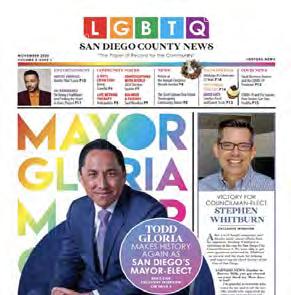
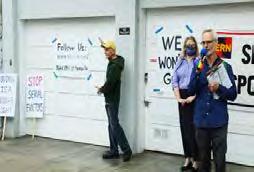


The doc winds up being more of a sociological analysis of how the cultural upheaval (civil rights, Vietnam) of the late 1960s made the film possible, as well as upending the Hollywood cowboy archetype by focusing on Joe Buck (Jon Voight) who moves to New York City from a small town in Texas and ends up becoming a sex worker for men and women. But he also develops a tender friendship with Ratso Rizzo (Dustin Hoffman) an ill, petty crook/ersatz pimp.

Director John Schlesinger was a closeted homosexual, and scenes in the movie concerning gay life were revolutionary, but so is the undeniable homoerotic vibe to the Buck/Ratso relationship. There are interviews with the surviving actors: Voight (acknowledging it was the best role/movie of his career), gay actor Bob Balaban, Brenda Vaccaro,

Amy Seiwert’s Imagery gets lucky with ‘Sketch 13’

but noticeably missing is Dustin Hoffman.
Director Nancy Buirski used an audio interview with Schlesinger, who died in 2003. Much is made about portraying New York City in its gritty, grimy reality. However, there’s little on the making of the film itself, behind-the-scenes material, its origins in the James Leo Herlihy novel, or the personal stories of the cast and crew.
What it does well is show primarily via Charles Kaiser (author of the highly recommended “The Gay Metropolis”) with gay historical context, on the cusp before Stonewall, which made the movie’s acceptance of homosexuality a landmark achievement.
 by Philip Mayard
by Philip Mayard
For the past 13 years, renowned choreographer Amy Seiwert and her company Amy Seiwert’s Imagery (ASI) have been a driving force in San Francisco’s dance scene, introducing Bay Area audiences to a remarkable array of world premiere works by emerging and established choreographers, while offering dancers from across the U.S. unique opportunities to collaborate in new and innovative ways.
With Seiwert recently being appointed to the position of Associate Artistic Director of Smuin Ballet in September and ASI ceasing operations by the end of the year, this month’s presentation of the company’s annual Sketch series will be a poignant celebration of ASI’s rich contributions to the Bay Area dance community.
“Sketch 13: Lucky” brings together four dance makers – Seiwert, ASI Artistic Fellow Natasha Adorlee, French-Canadian choreographer Hélène Simoneau, and internationally renowned choreographer Trey McIntyre – for an intensive workshop process with dancers from ASI, BalletMet, Sacramento Ballet, Smuin Ballet, and ODC/Dance. The program concludes with a performance of the four works at ODC Theater.
Appropriately, for “Sketch 13,” choreographers and their collaborator/dancers will be focusing on the theme of luck, challenging themselves to step out of their comfort zones, to flex their creative practices, and embrace the element of chance into their processes.
The works are typically finished just in time for the performance, so details are scant prior to the program, but McIntyre is using American Sign Language as a starting point and inspiration for his work, having collaborated with Antoine Hunter, a deaf dancer in the Bay Area.


Reflecting back on the past 13 years, Seiwert said, “As an artist, you need to be able to take risks in order to grow. Sketch started to address that need, creating a platform for choreographers to step outside of their comfort zones. For me, it’s been a place where the process is as valued as the results, which is rare in my field.”t
‘Sketch 13: Lucky,’ July 28-30 at ODC Theater, 3153 17th St. $13-65. www.asimagery.org
Dancers with Amy Seiwert’s Imagery
No. • May 2021 outwordmagazine.com page 34 page 2 page 25 page 26 page 4 page 15 page 35 Todrick Hall: Returning to Oz in Sonoma County SPECIAL ISSUE - CALIFORNIA PRIDE! Expressions on Social Justice LA Pride In-PersonAnnouncesEvents “PRIDE, Pronouns & Progress” Celebrate Pride With Netflix Queer Music for Pride DocumentaryTransgenderDoubleHeader Serving the lesbian,gay,bisexual,transgender,and queer communities since 1971 www.ebar.com Vol. 51 No. 46 November 18-24, 2021 11 Senior housing update Lena Hall ARTS 15 The by John Ferrannini PLGBTQ apartment building next to Mission Dolores Park, was rallying the community against plan to evict entire was with eviction notice. “A process server came to the rally to catch tenants and serve them,”Mooney, 51, told the Bay Area Reporter the following day, saying another tenant was served that “I’ve lost much sleep worrying about it and thinking where might go. I don’t want to leave.I love this city.” YetMooneymighthavetoleave theefforts page Chick-fil-A opens near SFcityline Rick Courtesy the publications B.A.R.joins The Bay Area Reporter, Tagg magazine, and the Washington Blade are three of six LGBTQ publications involved in new collaborative funded by Google. page Assembly race hits Castro Since 1971 by Matthew S.Bajko LongreviledbyLGBTQcommunitymembers, chicken sandwich purveyor Chick- fil-A is opening its newest Bay Area loca- tion mere minutes away from San Francisco’s city line. Perched above Interstate 280 in Daly City, the chain’s distinctive red signage hard to miss by drivers headed San Francisco In- ternational Airport, Silicon Valley, or San Mateo doorsTheChick-fil-ASerramonteCenteropensits November Serramonte Center CallanBoulevardoutsideof theshoppingmall. It is across the parking lot from the entrance to Macy’s brings number Chick-fil-A locations the Bay Area to 21, according the company,as another East Bay location also opensSusannaThursday. the mother of three children with her husband, Philip, is the local operator new Peninsula two-minute drive outside Francisco. In emailed statement to BayArea Reporter, invited Tenants fight ‘devastating’ Ellis Act evictions Larry Kuester, left, Lynn Nielsen, and Paul Mooney, all residents at 3661 19th Street, talk to supporters outside their home during a November 15 protest about their pending Ellis evictions. Reportflagshousingissuesin Castro,neighboringcommunities REACH CALIFORNIA’S LARGEST LGBTQ AUDIENCE. CALL 415-829-8937 See page 15 >> San Francisco Jewish Film Festival’s LGBTQ faves Cinematic chutzpah ‘Desperate Souls, Dark City, and the Legend of Midnight Cowboy’ screens at the SF Jewish Film Festival
by Gregg Shapiro
Based on the autobiographical novel by Makoto Takayama, director and co-screenwriter Daishi Matsunaga’s “Egoist” (Strand) is one of the most original and moving gay movies of the year. Slightly reminiscent of Hong Khaou’s 2014 “Lilting” (starring out actor Ben Whishaw), in which a mother and her son’s lover bond following a calamity, “Egoist” finds the perfect balance between eroticism and emotion.
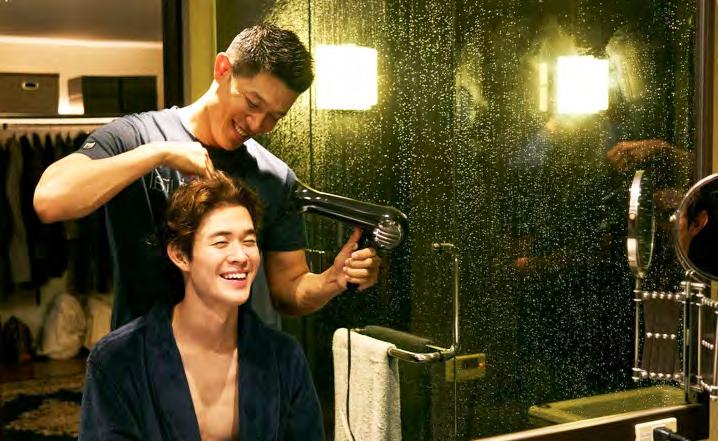
When he’s not working Kosuke (Ryôhei Suzuki), a hot, gay, single magazine editor, socializes with his gay friends. They go out to eat, get drunk, and have a good time together.
When Kosuke mentions that he wants to start working out more, one of his friends recommends Ryuta (Hio Miyazawa), an attractive, young, gay personal trainer.
Ryuta is on the opposite end of the social spectrum from Kosuke. He’s a high school dropout who still lives with his single mother Taeko (Sawako Agawa). He supports her with his work as a trainer (or at least that’s what we’re led to believe). Therefore, it’s not all that surprising when Kosuke and Ryuta find themselves attracted to each other, and then act on that attraction.
The relationship is sweet and affec-

 by Gregg Shapiro
by Gregg Shapiro

Like its lead character, novelist Leon (Thomas Schubert), writer/director Christian Petzold’s “Afire” (Sideshow/Janus Films) is a lot to handle. Thoroughly unlikeable and completely self-absorbed, Leon is the kind of character that might make some viewers give up on him less than halfway through the movie. But, don’t do that. Even though he doesn’t necessarily become easier to take, there is something of a payoff if you stick with him.
tionate. Kosuke generously provides for Ryuta, including regularly sending him home to his mother with bags of expensive sushi. But just as the couple seems to be hitting their stride, Ryuta breaks up with Kosuke. He admits that since he dropped out of high school, he has been turning tricks for his income. Kosuke is initially devastated, not by what Ryuta told him, but because the relationship ended abruptly.
Eventually, following scenes of Ryuta’s sex work, Kosuke reaches him (by hiring him because he won’t answer Kosuke’s calls), and the two are able to work through the situation in a mutually beneficial manner.
Ryuta gets a couple of jobs, one as a manual laborer and one working in a restaurant’s kitchen. Ryuta even invites Kosuke to meet Taeko, and they share a wonderful home-cooked meal together.
[Spoiler Alert:]
Just as their lives begin to settle into a romantic routine, tragedy strikes.
Ryuta dies in his sleep. It’s here that “Egoist” moves in an equally potent direction.
Kosuke, who lost his mother when he was in junior high, and Taeko seek comfort in each other. She reveals that she knew about his relationship with
her son, telling the story of how she asked Ryuta about Kosuke, and how she accepted them. Kosuke’s generosity continues, and he provides Taeko with money (which, at first, she declines), and they begin to spend time
together. However, there is more sadness to come just around the corner.
Suzuki, Miyazawa, and Agawa are all fantastic. Each actor gives a convincing and moving performance. Even with the heartbreaking elements
of the story, “Egoist” is strongly recommended; in Japanese with subtitles.
Rating: A-t


www.strandreleasing.com
After experiencing car trouble, Leon and Felix (Langston Uibel) trek eight miles through the woods with their luggage, arriving at Felix’s mother’s country home. Leon is intent on finishing his manuscript while there, and Felix is trying to come up with his portfolio to complete his art school application.

But their plans are disrupted when they discover that Felix’s flaky mother has already rented the house to Nadja (Paula Beer), a seasonal worker who scoops ice cream at the beach.
Forced to share the small bedroom, Felix tries to make the best of the situation while the moody Leon chooses to sulk. Making matters worse, they can hear Nadja having sex through the house’s thin walls. While attempting to sleep outside where it’s quieter, although swarming with gnats, Leon sees one of Nadja’s dates leave the house naked.
The next day, at the seaside, Felix meets Devid (Enno Trebs), who prefers being called a “rescue swimmer” to lifeguard. It turns out he was the same man Leon saw leaving the house the night before. Felix and Devid hit it off, and Felix invites him to dinner at the house with Nadja and Leon that evening. Leon is unneces-

sarily cruel to Devid, dampening the mood.
Almost a character itself, the wildfires burning in the distance play a significant role in the movie. There is the constant sound of aircraft flying overhead. The fires can be seen from the roof of the house. At one point, ash floats in the air like snowflakes. The wildlife in the woods moves closer to the house, and a herd of wild boars is severely affected (consider this a trigger warning).
The main thing to know about “Afire” is that no one is as they appear, beginning with Felix and Devid who begin a sweet and affectionate sexual relationship. There’s also more to Nadja than meets the eye as Leon
discovers.
The same is true of Helmut (Matthieu Brandt), Leon’s publisher/editor, who comes to the house to meet with Leon about his new manuscript, only to have a serious and revelatory health crisis.
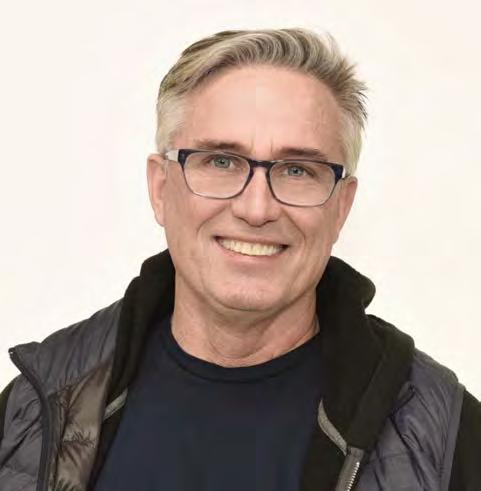
“Afire” takes a long time to ignite, but once it does, brace yourself. The film’s finale, which features a devastating tragedy, is nothing short of heartbreaking. And yet, a strange kind of resolution occurs, that feels both literary and slightly forced.
In German with subtitles. Rating: B-t www.janusfilms.com
14 • Bay area reporter • July 20-26, 2023 ‘Egoist’ - a Tokyo love story ‘Afire’s burning love t << Film StevenUnderhill 415 370 7152 • StevenUnderhill.com Professional headshots / profile pics Weddings / Events AUTO EROTICA PURVEYOR OF VINTAGE PORN MAGAZINES • BOOKS • PHOTOGRAPHS 4077A 18th St. OPEN EVERY DAY 415•861•5787{ { AUTO EROTICA PURVEYOR OF VINTAGE PORN MAGAZINES • BOOKS • PHOTOGRAPHS 4077A 18th St. OPEN EVERY DAY 415•861•5787{ { AUTO EROTICA PURVEYOR OF VINTAGE PORN MAGAZINES • BOOKS • PHOTOGRAPHS 4077A 18th St. OPEN EVERY DAY 415•861•5787{ { WE BUY & SELL GAY STUFF! MONDAY-SATURDAY
Janus Films
Hio Miyazawa (seated) and Ryôhei Suzuki in ‘Egoist’ The
main cast
of ‘Afire’
“Total physical and mental inertia are highly agreeable, much more so than we allow ourselves to imagine. A beach not only permits such inertia but enforces it, thus neatly eliminating all problems of guilt. It is now the only place in our overly active world that does.”
—John Kenneth Galbraith
From page 13

Queen of Chutzpah

Queen of the Deuce” could also be called Queen of Chutzpah as it details the eccentric, one-of-a-kind life story of Chelly Wilson. Her grandson David captures the film’s tone when he says, “She was Jewish and celebrated Christmas in a gay porn theatre (Eros). It doesn’t get any weirder than that.”
Born in Greece, forced by her father to marry, she got the last boat to America before the Holocaust, arriving with five dollars in her pocket. But with her vast entrepreneurial skills, proudly bought straight and gay porn theaters in the 1970s in the area of 42nd Street called The Deuce. She later produced and distributed porn films, all of which made her rich.
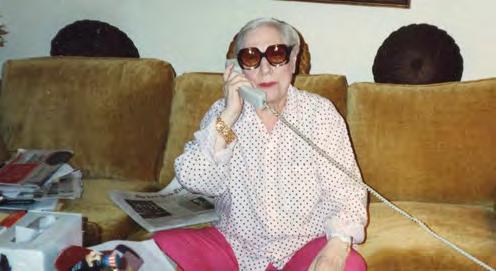
meets a girl who just broke up with his best friend Ido. She regrets rejecting him and asks Carmel to tell Ido to call her. Carmel goes home to find Ido there, waiting to tell him about the end of his relationship.
Carmel slowly realizes he has deeper feelings for Ido. Will he relay his ex-girlfriend’s message to Ido? What’s so lovely about this piece is the subtlety because the audience is finding out the same time as Carmel where his erotic direction lies. The interplay between religion and desire is positively conveyed also in its delicacy; charming but incisive.
Diving In” chronicles Rachel and Yael on their first night of intimacy, highlighting the perils of cunnilingus when Yael discovers a holocaust museum inside Rachel’s vagina, which among other things means being careful of any sharp edges. Yael advises therapy for Rachel to help her deal with anxiety about the Holocaust that is interfering with her ability to experience pleasure. Clearly a metaphor, this bizarre short almost defies explanation, but I won’t spoil the ending.
The 27-minute “Arava” concerns a teenage girl (Arava, which means willow) who has returned home after spending six months in rehab. She reunites with her troublemaker best friend Tzipi, running away from the law, who convinces her to go on a trip to northern Israel. Both women are isolated from their families.
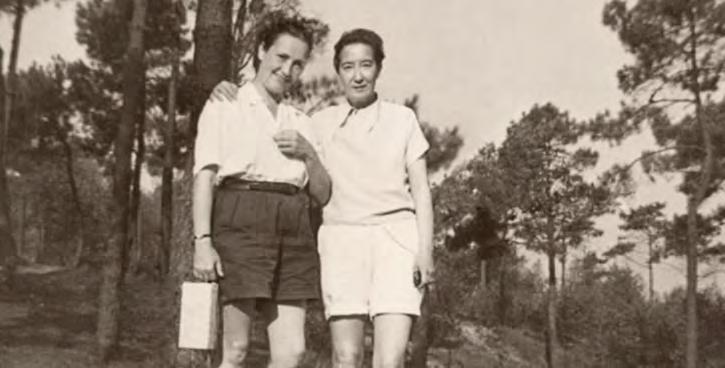



They hitchhike through the country facing the challenging realities of growing up –which here might mean dealing with bisexual feelings– as they navigate that unpredictable border between friendship and romantic love. They crash one night at the home of a musician who sells pomegranates. Arava is in search of belonging, a spiritual path leading to some kind of healing. As runaways and at-risk youth, both women must create some identity for themselves, as they reject the tenets of their Jewish faith. Unexpectedly moving, you will root for them as they struggle to navigate a bumpy road to adulthood.
Strong stories
There are two other films worth mentioning. “Nelly & Nadine” I reviewed last year when it played Frameline and made my list of top 15 movies of 2022. Opera singer/spy Nelly and literary/resistance fighter Nadine meet in Ravensbruck concentration camp as political prisoners and fall in love, eventually reunited two years after war’s end.
They move to Venezuela, living together as a secret couple. Sylvie, Nelly’s granddaughter, pieces together all the clues, left in a box to her, containing photographs, Super8 footage, tapes, and diary. This documentary is heartbreaking and a thrilling Holocaust love story with a deserved happy ending. If you haven’t seen it yet, “Nelly & Nadine” is essential viewing.
The other film worth noting is the closing night documentary, “Bella!”
Before AOC and Stacey Abrams, there was Bella Abzug, one of the founders of the women’s rights movement. She served in Congress from 1971 to 1977, winning with her campaign slogan, “This woman’s place is in the house, the House of Representatives.”
A taboo-breaking big-hearted, family-oriented woman, she lived with her husband and kids, alongside her women lovers. Although she died in 1994, through still photos, New York City archival footage, audiotapes made before her death by her son-in-law, and animated sequences in a comic book style highlighting key moments of her life, she’s resurrected as the Jewish lesbian Auntie Mame character she became, celebrated and mythologized by her family. It’s a captivating off-beat take on the immigrant experience that must be seen to be believed. It’s a total gem not to be overlooked.
Other shorts and docs of note
Among the shorts, the best is a small jewel called “I Missed You at Synagogue” about a religious boy named Carmel who, after services,
Known for her abrasiveness and trademark colorful hats, she was the first Congress member to support gay rights, introducing the first federal gay rights bill in 1974. This film was not available to the press, but includes new interviews with Shirley MacLaine, Gloria Steinem, Hillary Clinton, and Nancy Pelosi among others as it narrates this straight ally’s stormy career and astonishing legacy on behalf of women, the working class, POC communities, and queer people.t
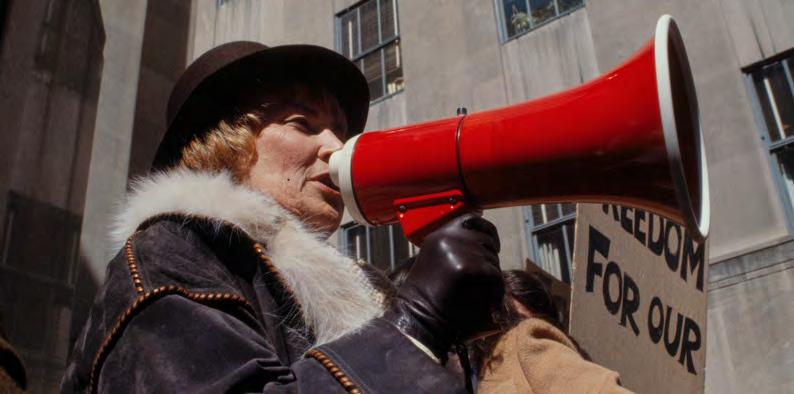
The San Francisco Jewish Film Festival, July 20-August 6 at the Castro Theatre (429 Castro St.), Vogue Theatre (3290 Sacramento St.), and the Piedmont Theatre (4186 Piedmont Ave., Oakland). $15-$75 single films and events; festival pass $395-$425. https://jfi. org/sfjff-2023



July 20-26, 2023 • Bay area reporter • 15 t Film >> 3991-A 17th Street, Market & Castro 415-864-9795 Proudly serving the community since 1977. Open Daily! New Adjusted Hours Monday 8am (last seating 9:45pm) Tuesday 8am (last seating 9:45pm) Wednesday 8am (last seating 9:45pm) Thursday 8am Open 24 Hours Friday Open 24 Hours Saturday Open 24 Hours Sunday 7am (last seating 9:45pm) PRESENTS FROM “ WOW! ” – KCBS “ HIGHEST RATING! A VALENTINE TO THE CITY.” – SF Chronicle “ MIND BLOWING. 90 MINUTES OF ACROBATIC BLISS.” – Mercury News “JAW-DROPPING. THE SHOW IS A STUNNER.” – Hoodline “ BEST NIGHT OUT!” – SF Magazine “A CELEBRATION.” – KQED Arts ClubFugaziSF.com | 415-273-0600 CLUB FUGAZI | 678 Green Street | San Francisco
Weds–Suns
& Small Bites Available In the heart of North Beach, a historic jewel box theatre hosts high-flying acrobats creating a thrilling and moving love letter to the City by the Bay. Enjoy drinks and cicchetti (small bites). Come with a date or friends, celebrate birthdays and anniversaries, book a corporate event. The perfect place for a party!
Shows
Drinks
<<
SFJFF
Above to Below: ‘Queen of the Deuce’; ‘I Missed You at Synagogue’; ‘Diving In’; ‘Arava’; ‘Nelly & Nadine’; ‘Bella!’
Shelly Lares Tejano country singer’s musical life
by Laura Moreno
This year Shelly Lares was presented with a Lifetime Achievement Award at this year’s Tejano Music Awards Show. At 51, she’s been singing professionally 41 years, admired for her unique blend of Tejano country music.

The Tejano icon got her start in 1982 at age 10 when she serendipitously planned to sing a song at her sister’s wedding. At the rehearsal with the wellknown band they had hired for the wedding, The Hot Tamales, jaws dropped when the little girl started singing.
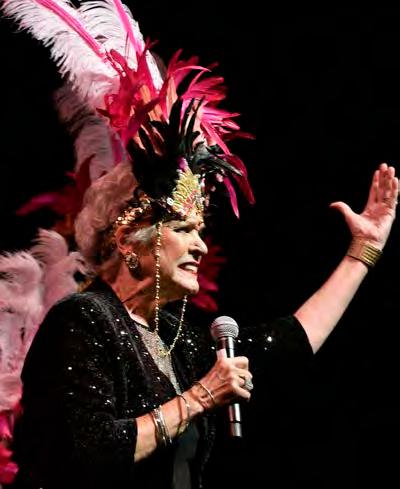
As fate would have it, the Lares family hired them because they were fans of lead singer David Marez, but he had just quit the band the week before. (Shelly and he would years later collaborate on music.) When they heard her voice, The Hot Tamales asked her parents if she could please start singing with them beginning immediately, and a star was born.
That year, Shelly Lares (pronounced ‘lahr-ez’ as two syllables in Spanish) crossed paths with another up-andcoming icon of the genre, Selena, also age 10, who had been singing professionally since the age of six. The two became instant best friends.

Mutual fans
Shelly Lares says she and Selena were each others’ biggest fans and that they were never competitive, contrary to what people might assume. Even rocker Chris Perez’s ghostwriter for his book made the misstep of portraying Shelly Lares in his book as envious, against all accounts. Actually, Chris Perez was Shelly’s first guitarist, and the Grammy Award-winning artist Chris Perez was later was recruited into Selena’s band and married Selena.
Band members have recalled that whenever Shelly and Selena met backstage –which wasn’t that often since Selena was based in Corpus Christi, not San Antonio– the two singers would laugh together non-stop, thrilled to be in each others’ orbit.
But as their careers gained momentum in the 1990s, putting Tejano music on the map nationally for the first time, many people noticed that although Lares was selling records and garnering corporate sponsorships, Selena kept sweeping the awards shows along with a good deal of the media attention.
As consummate professionals and great musicians gifted with beautiful voices, they both had their fans and received tons of air play, but as it was
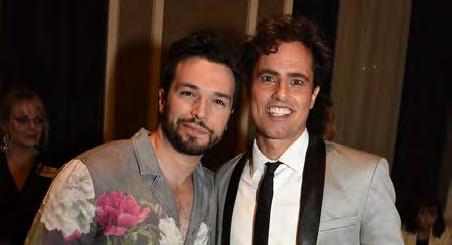

often expressed, “Selena had ‘the look,’ “ meaning that she was “morenita,” or indigenous-looking, like many of her fans, not white-looking or on the lighter side like almost every other major star or news anchor in Spanish. For the first time in our history, having green eyes and lighter hair like Shelly Lares was no longer a plus.
Awards due
In 1995, one month before Selena died, Lares finally seemed to receive her long-awaited due when her name was announced as Female Entertainer of the Year on the televised Tejano Music Awards Show. But long before it was a “thing” to flub the announcement of the most important award of the evening, the powers that be announced it had all been a careless mistake. Selena was in fact the winner.
I don’t know what happened, but I know that everyone, both in the audience and backstage, felt that night and for some time to come that such a mistake never could have been made honestly. No one could ever mistake Shelly for Selena.
Selena swept up the music award in consecutive years from 1986 until 1997 (except for 1988) even after her death. Selena told Shelly she was starting to feel bad about winning every year because she knew how hard Shelly had worked on her music.
Although Shelly had been nominated every year as well, it was not until 1998 that Lares’ success was finally acknowledged and she won a Tejano Music Award, at last becoming the most popular Tejano singer.


Soon after, Vince Gill’s guitar playing and vocals were featured on Shelly’s album “Mil Besos.” She began writing music for other artists as well.
When Selena suddenly was murdered by her fan club president, Shelly Lares was not the only artist so devastated by the news that she had to cancel all of her performances. The killer, Yolanda Saldivar, had actually
approached Shelly first about starting a fan club, but was immediately turned down. Shelly and the band recognized Yolanda as the creepy stalker-like fan who was always in the front row of just about every performance. But because Selena was from out of town, the information apparently never got communicated to Selena.
Out for truth
In 2021, Shelly Lares finally came out to her fans. She had already come out to her family in 2008, but decided to simply share photos of her life on social media without using labels. Like Selena, Shelly is also from a very conservative religious family, and her father also guided her career, so she was very nervous about coming out to them. She decided the right thing to do was to let them have their feelings and respond in their own way. But actually, it was fine.

She has her family’s unconditional love and support and has stated in interviews, “It’s not wrong if you have good intentions with people.”
In 2022, she recorded her hit single “Breakthrough” with rapper Squishy and Eric Lee to celebrate Pride month. She also sings a soul-stirring rendition of the song “Girl Crush.”
It is noteworthy that Shelly Lares, Selena and Ricky Martin, all born in 1971, command a stage presence and forge a connection with the public never before seen in Latin music. They are very different performers from every singer that came before them.
Next, although Lares recently retired from music, she plans to finally do something she’s long wanted to do: record a Christian music album.t www.ShellyLares.online



Help is on the Way 27 @ Marines’ Memorial Theater
Photos by Steven Underhill
Cast members from the new touring company of the classic musical “Les Misérables” joined other Broadway and cabaret stars at the Marines’ Memorial Theater on July 16 for “Help is On the Way 27: Broadway & Beyond,” the latest fundraiser from the Richmond/Ermet Aid Foundation. The concert included performances by David Burnham, Marta Sanders Lisa Vroman, Leanne Borghesi, and tributes to the late Carole Cook and Leslie Jordan. The night continued at an after-party at the Beacon Grand Hotel. www.reaf-sf.org For more Steven Underhill photos, visit www.facebook.com/ lgbtsf.nightlife and www.stevenunderhill.com.
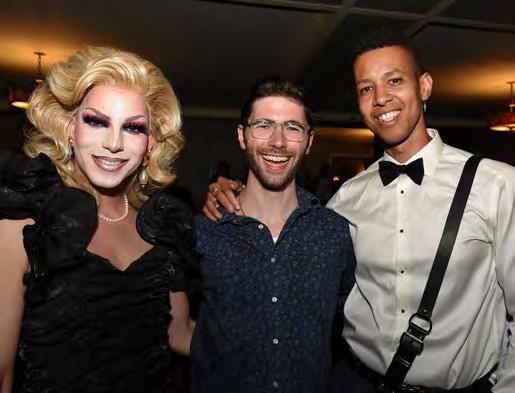
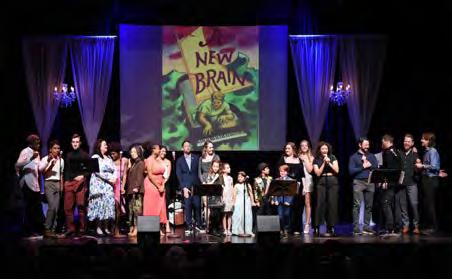
16 • Bay area reporter • July 20-26, 2023
t << Music
Tejano singer Shelly Lares
Instagram
Above: Shelly Lares, right, and her girlfriend Mia Gutierrez
Instagram
Below: Selena (left) hugs a young Shelly Lares
























































US 101 TO EXIT 484. 288 GOLF COURSE DRIVE WEST, ROHNERT PARK, CA P 707.588.7100 PLAY WITHIN YOUR LIMITS. IF YOU THINK YOU HAVE A GAMBLING PROBLEM, CALL 1-800-GAMBLER FOR HELP. ROHNERT PARK, CA. © 2023 GRATON RESORT & CASINO IT’S All In ONE PLACE LUXURIOUS ROOMS WORLD-CLASS SPA & SALON RESORT-STYLE POOL AWARD-WINNING DINING LIVE ENTERTAINMENT One amazing destination, so many reasons to experience it.
‘Daddy Lover God’
by Brian Bromberger
Don Shewey’s book, “Daddy Lover God,” bills itself as a memoir and instruction manual, but it primarily chronicles Shewey’s psycho-sexual-spiritual adventures. Shewey, who began his career as a journalist and critic writing primarily about the theater, now is a licensed psychotherapist whose private practice specializes in sex and intimacy coaching. He defines himself as a pleasure activist. His previous book is “The Paradox of Porn: Notes on Gay Male Sexual Culture.”
“Daddy Lover God” charts his journey as a sacred intimate, inspired by the visionary teachings of Joseph Kramer and attending his pioneering weekend workshop at the Body Electric School for Massage in Oakland in 1987. He learned the basic principles of tantra, conscious breathing, and Taoist erotic massage.
Sacred intimate Tantra builds up one’s orgasmic capacity such that one is aroused to a state of sexual ecstasy without ejaculation or orgasm. Tantra helps cultivate one’s own erotic energy that can be distributed throughout the whole body, the same energy that supplies your ability to love, pray, and be creative.
Don Shewey’s sensual sexual memoir
Shewey defines a sacred intimate as one facilitating self-knowledge through erotic pleasure. He claims sacred intimates combine the role of priest, prostitute, and psychotherapist, thus approaching sexuality as related to spirituality, seeing the body as sacred, desire as holy and sexual embodiment as an expression of the soul.
For Kramer and Shewey, sex can be communion with God. Shewey draws an analogy with priests who are not God themselves but act as a go-between, channeling the divine presence to us (primarily through sacraments).
In that sense, sex is a form of prayer, invoking a kind of transcendence, activating the entire body with touch (massage) and breath from head to toe before zeroing in on the genitals.
The Daddy component enters because Shewey had no love for his father, who was uneducated, bigoted, alcoholic, and abusive.
Shewey’s attraction to older men constitutes his search for a father figure
he can love, to fill in a hole in his life created by his own absent lack-ofaffectionate Daddy. Thus in Shewey’s practice of sacred intimacy he includes all three archetypes of Daddy, Lover, and God.
Case histories
The book is divided into three parts.
Part One, 1993-1995 is his initial experiences as a sacred intimate (at age 39), attempting to construct his own roadmap in a practice that was sus-
tainable both financially and psychologically. These chapters read like sexual case histories/ vignettes of his clients, many of which verge on pornography in their explicit details.
Shewey excels here in revealing how he created a safe space, conducted as a kind of ritual (that Catholic background again) for these often uptight, wounded men to explore their erotic feelings in an environment where they didn’t have to label themselves (many were married to women).
Shewey enabled them to satisfy their curiosity of touching men, especially since they had socio-cultural and religious reasons for keeping their sexuality hidden. Clients were then able to trust Shewey with their fears, desires (in all forms, including kink), grief, and anxieties.
Part Two, 1964-1994, is the heart of the book, with autobiographical details through a primarily sexual lens, whether it was tea room, bath house experiences, or acting as a midwife to dying people with AIDS. Born in Denver, he spent his childhood as an Air Force brat, son of a military father. He studied at Rice University and Boston University, eventually moving and living in New York City.
Part Three, 1995-2002, feature more client case histories but through the lens of professional issues that arise, such as when to have sex or not to have sex with a patron and figuring out where love feelings play a role, as well as questioning his calling and whether he should continue this work, especially now that he had a husband at home.
Sexual self-knowledge
The book concludes with an appendix containing an invaluable 63-page interview with Joseph Kramer that appeared in the April 21, 1992 issue of The Village Voice.
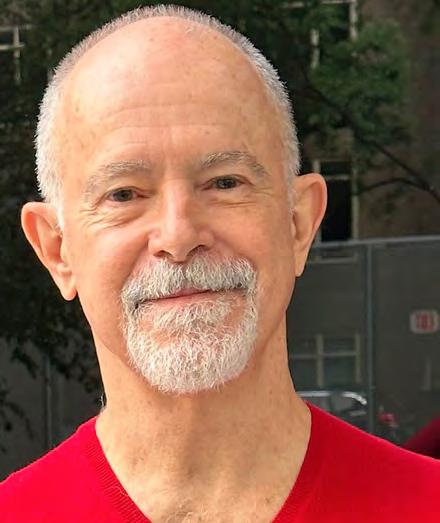
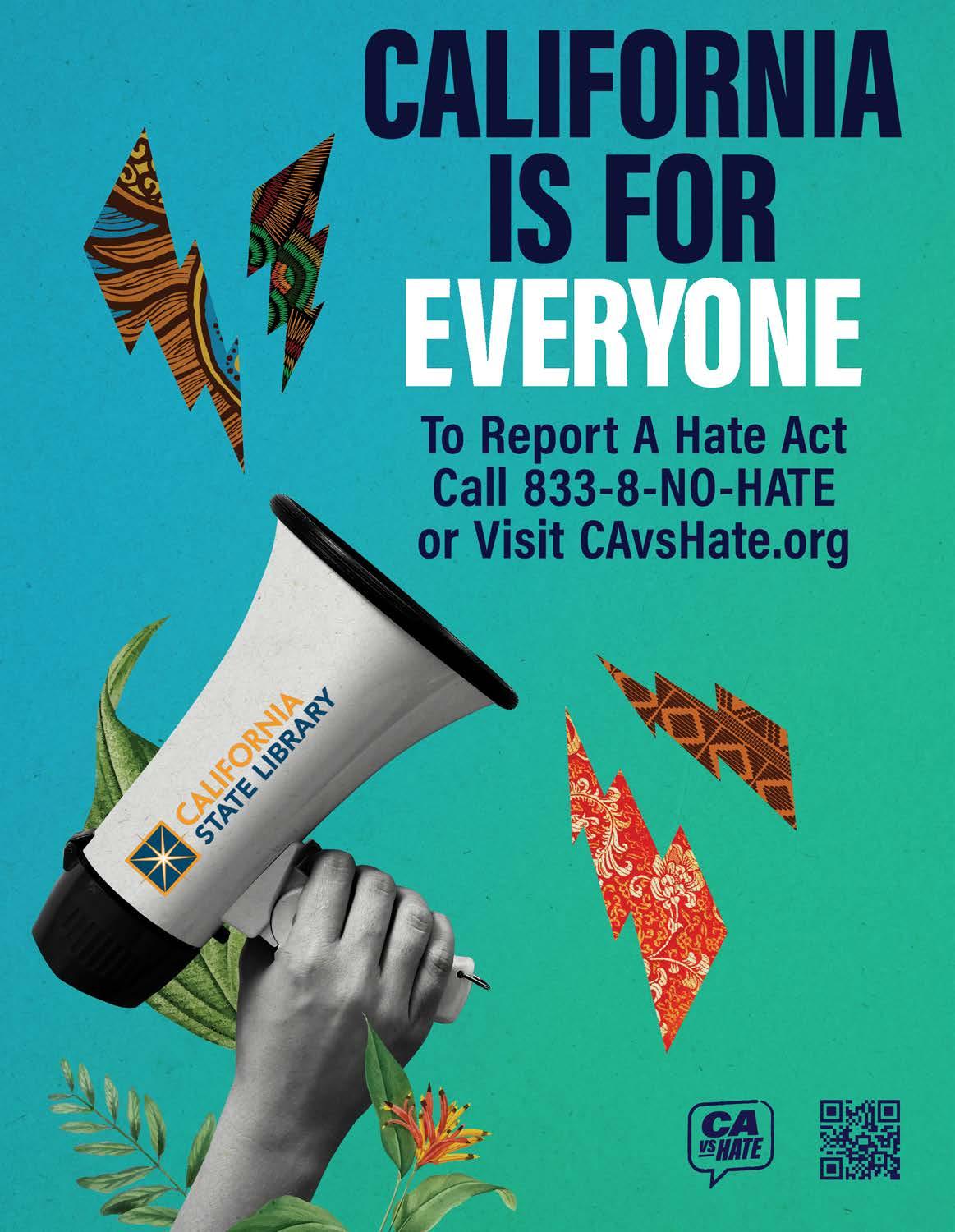
Whether or not one agrees with the philosophy undergirding sacred intimates, one can applaud Shewey for his brutal honesty, as well as his willingness to be self-critical especially in his early years when he had to deal with impatience, frustration, insecurity, body snobbism, skepticism, fear, and ego.
One wishes Shewey would have explored more deeply some of the objections raised about sacred intimates and how they differ from sex workers, who are also paid for their ‘services.’
Also, a discussion of how one separates one’s personal desires from that of your client’s would have been beneficial. In addition, Shewey doesn’t address the critique that hiring sacred intimates reeks of elitism, because only privileged queer people can afford their services or attend expensive weekend workshops.
Finally, Shewey’s almost pornographic description of his services to clients might be a hindrance for some in any professional recognition of sacred intimacy as a legitimate form of therapy.
Even if you object to this whole concept of sacred intimates on moral grounds, when so many queer people feel under assault, Shewey’s practical guidebook in enhancing erotic pleasure as a means of bolstering one’s queer identity, might not only be a form of sexual healing, but a vital means of strengthening emotional and psychic resilience.t
‘Daddy Lover God: A Sacred Intimate Journey,’ by Don Shewey. $20. Joybody Books www.joy-body.com www.donshewey.com

at Fabulosa
Tuesday
25, 7pm.
St.
18 • Bay area reporter • July 20-26, 2023
Meet Don Shewey, somatic sex educator JoJo Bear and adult video actor Allen Silver (author of “Man of Use”) at ‘Sex Worker Story Hour’
Books,
July
489 Castro
www.fabulosabooks.com
t << Books
Author Don Shewey
Manning up New translations of Thomas Mann and Marcel Proust
there are considerations in 2023 that might not have vexed earlier translators. In “Louisey,” Searls fixes previous translations of the entertainments of the Germans by changing “hideous Negroes” and “Negro dances” to “hideous Africans” and “African dances.” These are not small matters, the “corrections” having no impact on the integrity of the original but with a salutary effect on the present-day reader.

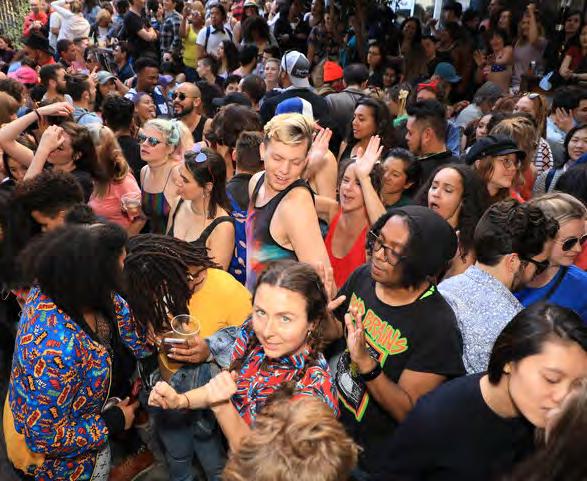 by Tim Pfaff
by Tim Pfaff
Today’s Thomas Mann is a victim of his own high reputation: in a word, lofty, in another, forbidding.

There’s never been a dip in esteem for Mann, the German author who won the Nobel Prize in Literature in 1929. But generations of stuffy English translations have done little to make Mann as read as admired across the Atlantic. So, Damian Searls’s just-published translations, “New Selected Stories” (Liveright), fleet but sure-footed, come as a relief, a long-overdue exhalation.
The joke once went that when Mann’s novels were first published, in German, they appeared in two volumes– the second containing the verb. Compared to his contemporaries James Joyce and Marcel Proust, Mann was not an experimenter. A “master writer” and nothing short of the conscience of a(ll?) people, Mann wrote in a dense style not atypical for his time, just better than most. There is no evidence, in the texts, anyway, that Mann sought to be an easy read.
Lodestar of gay literature
Was Mann gay? It depends on your definition of “gay,” and yes. Homoerotic themes and elements appear throughout his writing, if never more explicitly than “Death in Venice” of 1911. But “Death” has been a central text in gay literature to the point where a throwaway line in one translation –what belongs to you, the barber’s promise to protagonist Gustav Aschenbach, who has a sudden desire to look younger–has resurfaced as the title of one of today’s most influential gay novels.
The centerpiece of the new collection, “Death” tells the story of Aschenbach’s toxic obsession with the Polish boy Tadzio, whom he encounters on a getaway in a swank hotel on the Lido in Venice. Generations of gay readers have stalked the novella with the same urgent lust, all too often then rebuffed by translations studiously meaning to capture both consent and style.
Speaking personally for a moment, Searls’s is somewhere around the tenth translation of “Death” in my personal library. If the subject matter were any less incendiary, the artistic stakes any lower, I might well have quit. When I think back on those earlier translations, each of which seemed an improvement on the previous ones, the collective impression I have is of offputting, seemingly unreadable blocks of type, pages without margins, scant room between lines, and not nearly enough word spaces, equally important and off-putting.
Without abridgement, Searls’s avoids the knotty weight of important passages, beginning with the stage-setting opening and including a humid holding pattern in the explanation of the source of the plague gripping Venice. I was so startled by the swift pace of Searls’s translation that it all seemed over too soon, not that there was any slackening of impact.
An impossible, forbidding destination
It’s as if Searls has found where the words and punctuation belong to address the present-day reader. There’s no dumbing down, yet somehow Searls’s “Death” reads, if not conversationally, more like personal storytelling, to the work’s advantage. And the humor and irony that are such essential components of Mann’s style, if mostly overlooked, surface readily if without fanfare.
Felicities of language abound without somehow calling attention to themselves, and away from the narrative. Besotted with Tadzio, Aschenbach “was overreacting and enjoying it, and much too arrogant to fear an emotion.”
Following Tadzio’s family through Venice, “he found what he was looking for bent over a prayer stool during service” at St. Mark’s. “Up in front, the richly ornamented priest walked back and forth and fussed and sang; incense
billowed, … and the musty sweet sacrificial smell seemed to have another scent quietly mixed in: that of the diseased city. But through the vapor and the glittering, Aschenbach saw the beautiful boy up there turn his head, look for him, and see him.”
The makeup artist who returns to Aschenbach “what belongs to him” brushes off his work as “a trivial little boost to what was already there.” “Now the gentleman can fall in love without a care in the world,” he assures Aschenbach. “The bewitched customer left in a state of dreamlike bliss, though timorous and confused.”
Despite his idolizing –and idealizing– of Tadzio, “Aschenbach was pained to feel, as he had so often before, that language can only praise physical beauty, not reproduce it.” As for Venice itself, “now that the city had made him sick twice, he had no choice but to see it henceforth as an impossible, forbidding destination; he was no match for it, and it was pointless ever to visit there again.” Those who have been roughed up by Venice’s “other side” will understand.
Other Mann works have proved resistant to pleasure reading. Mann intended “Death in Venice” to be a companion piece to another novella, “Confessions of a Con Artist, by Felix Krull,” left unfinished. It’s proved to be among the more baffling of Mann’s writings, and many a reader has quit, feeling conned. Searls saves it for last and makes compelling reading of it.
He adds to the importance of his translation by tackling other lesserknown Mann works, including two longish selections from the “Buddenbrooks” novels and “Louisey,” a story even most ardent Mann readers might have missed.
Translation matters
A seasoned and versatile a translator, Searls has his own solutions to the problems of bearing another artist’s message while adding to it something new. And
“After his private diaries were published in the 1970s, … it became clear how deeply his emotional life was homosexual,” Searls writes. “There is no evidence of him ever having had sexual contact with men or boys, but he passionately and tumultuously felt love for young men and boys throughout his life.” It’s a fine distinction eminently worth making.
Translation as an artistic activity with its own validity is an enterprise that has steadily gained recognition and currency. There are readers for whom translation per se may not matter, but, again speaking for myself, no amount of intention or desire
on my part allowed me to read “War and Peace” before the Anthony Briggs translation or Alessandro Manzoni’s “The Betrothed” –long in my crosshairs– until Michael E. Moore’s. As synchronicity would have it, The New York Review Books has just published a new translation of Proust’s “Swann’s Way” by James Grieve. If there’s a novel that has famously taxed leaders, enough to shorten reading, it’s “In Search of Lost Time.” Lydia Davis’ masterful translation for the newish Penguin edition has brought a new generation of readers into the fold. On quick inspection, Grieve’s “Swann” will mark another step forward in translation as rich as the originals, but speaking to readers now.t
Thomas Mann, ‘New Selected Stories,’ translated from the German by Damion Searls, Liveright, 252 pp. $30. www.wwnorton.com
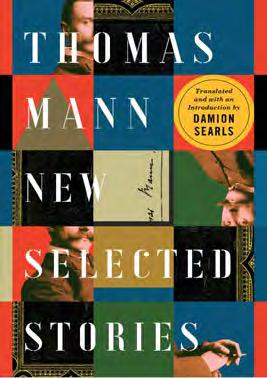
Marcel Proust, ‘Swann’s Way,’ translated from the French by James Grieve, New York Review Books, 450 pp. $18.95. nyrb.com
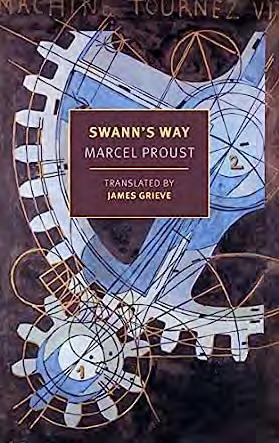

Personals Massage>>
MEN TO MEN MASSAGE

I'm a Tall Latin Man. If you're looking, I'm the right guy for you. My rates are $90/hr & $130/90 min. My work hours: 10am-10pm everyday. 415- 5150594 Patrick, call or text. See pics on ebar.com

July 20-26, 2023 • Bay area reporter • 19
t Books & Events>>
Going out From packed patio parties (like El Rio, seen here) to contemplative art museum collections, a wide array of nightlife and arts listings await your selection, this week and every week in Going Out on www.ebar.com.
Thomas Mann
photo
Marcel Proust
Translator Damion Searls
EVERYTHING YOU LOVE ABOUT THE ACADEMY. AND TONS MORE.



Sauropods were Mesozoic marvels, measuring up to 60 feet tall and weighing up to 80 tons. Discover the world’s largest dinosaurs at the world’s only aquarium + planetarium + rainforest + natural history museum. With life-size models, fossil replicas, and more.

Now open | Get tickets at calacademy.org
Every visit supports our mission to regenerate the natural world.
The World’s Largest Dinosaurs is organized by the American Museum of Natural History, New York (www.amnh.org), in collaboration with Coolture Marketing, Bogotá, Colombia. 32106-CAS-WLD-Bay Area Reporter-Roof-9.75x16-05.24.23-FA.indd 1 5/24/23 4:05 PM













 by John Ferrannini
by John Ferrannini










 by Kevin Naff
by Kevin Naff









 compiled by Cynthia Laird
compiled by Cynthia Laird

















































































































 by Tim Pfaff
by Tim Pfaff









